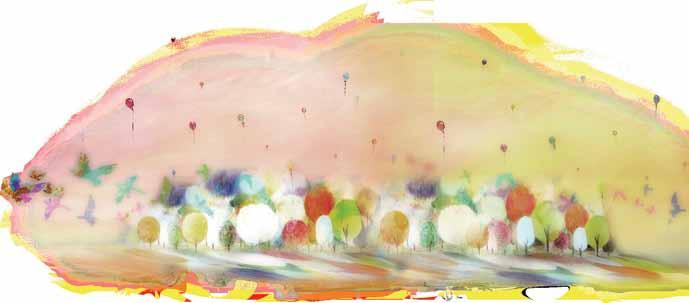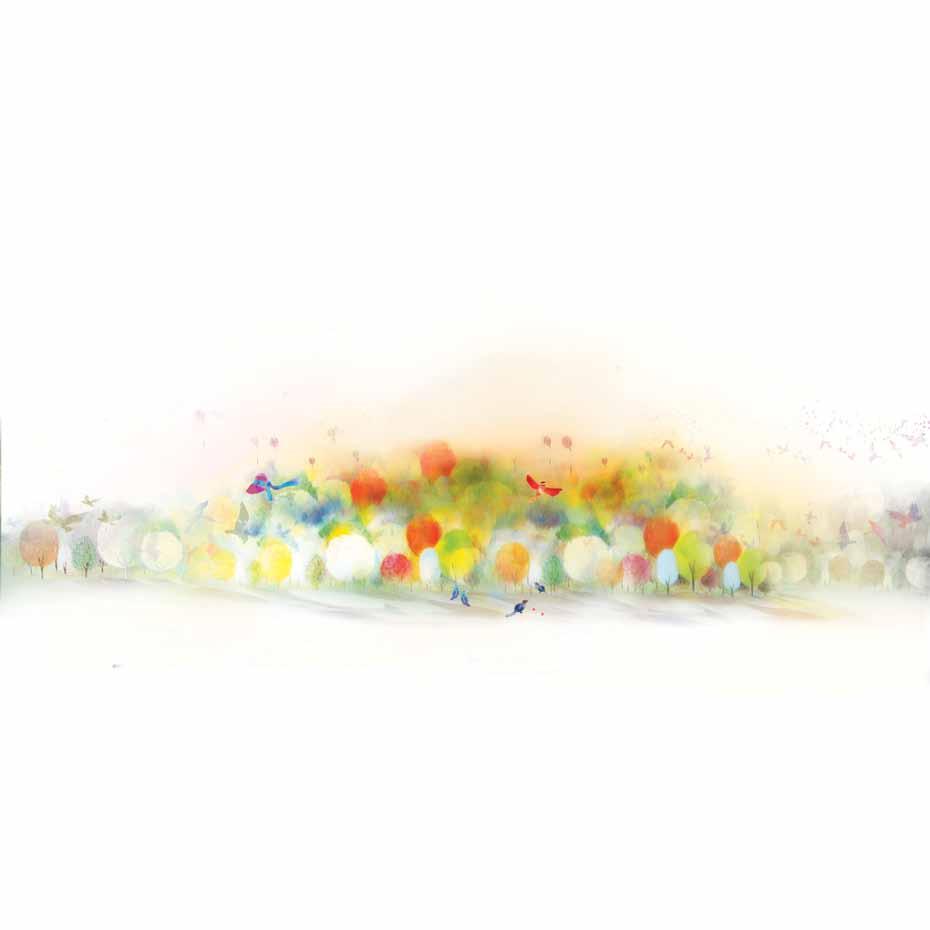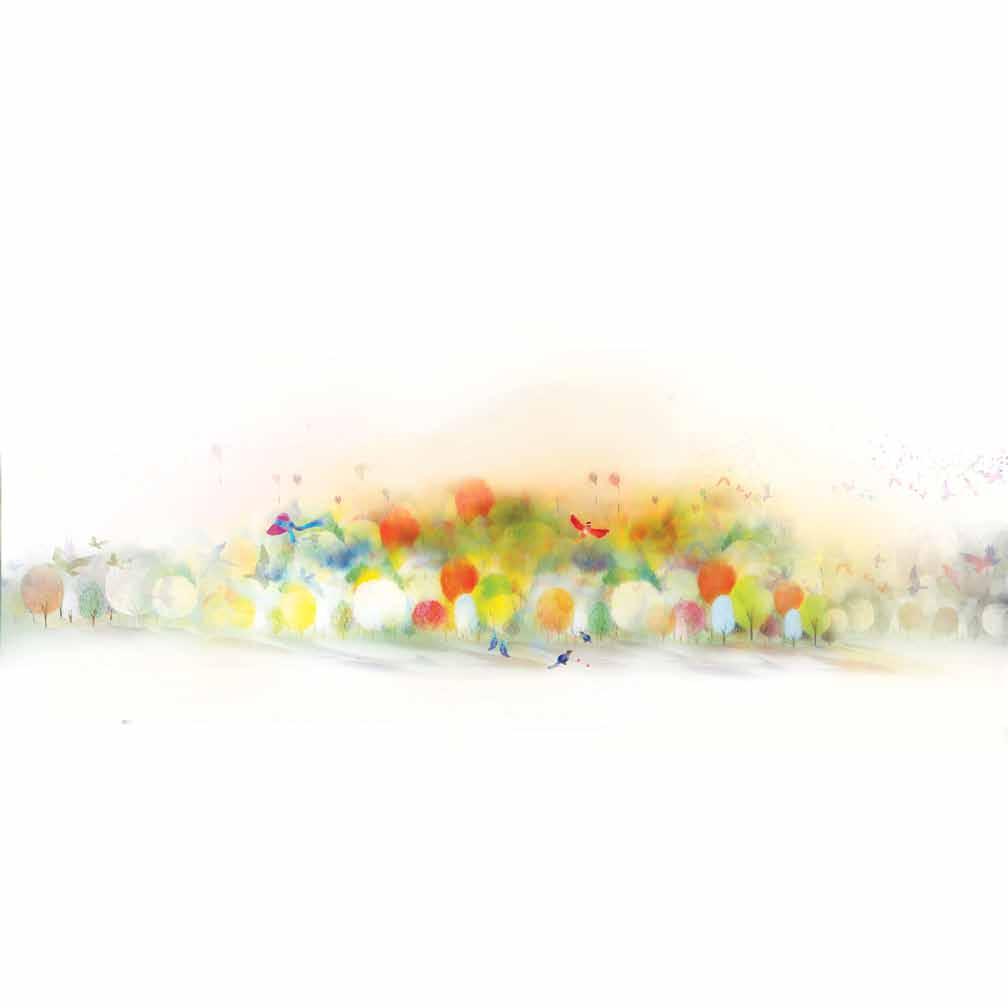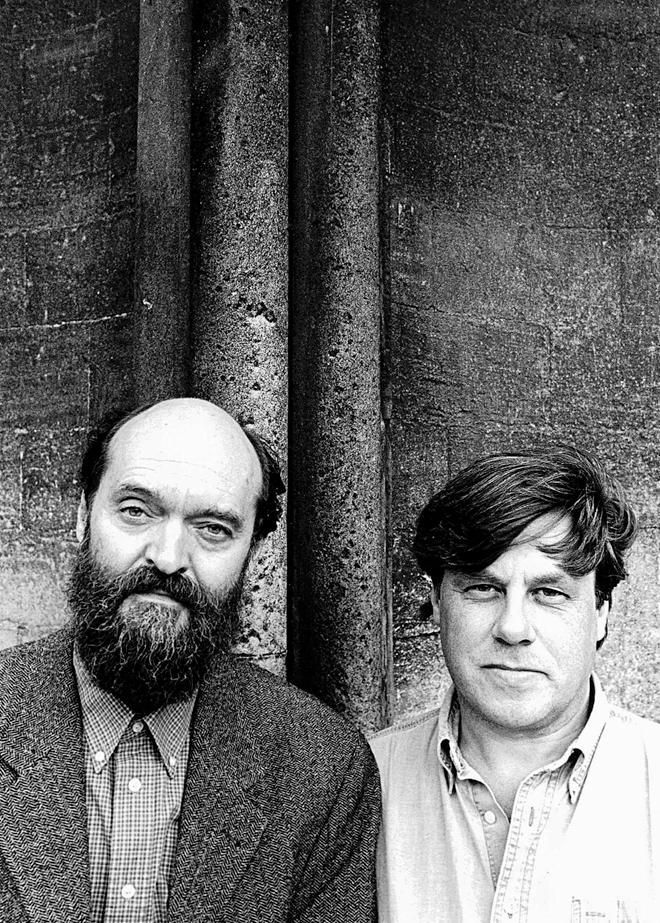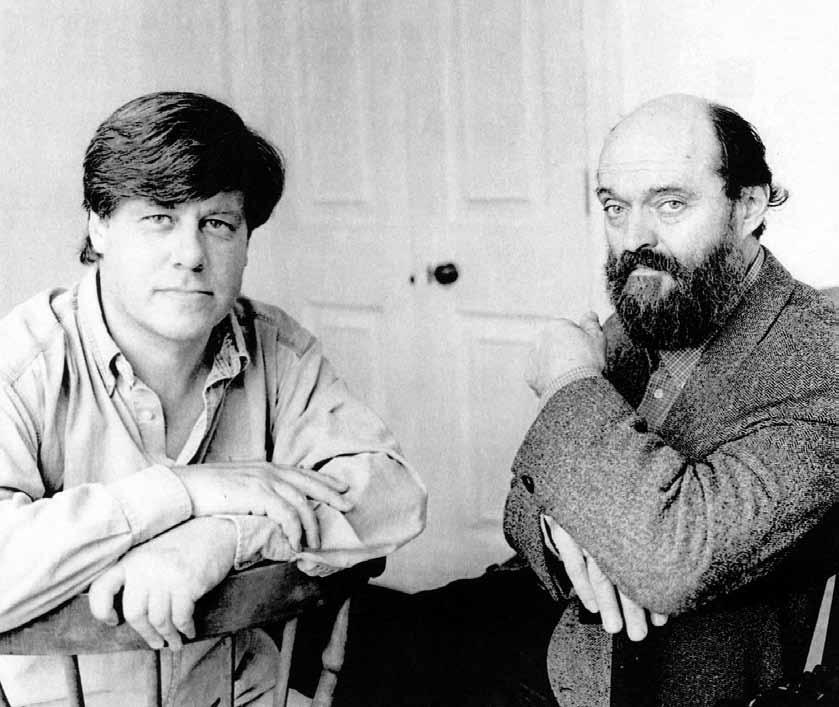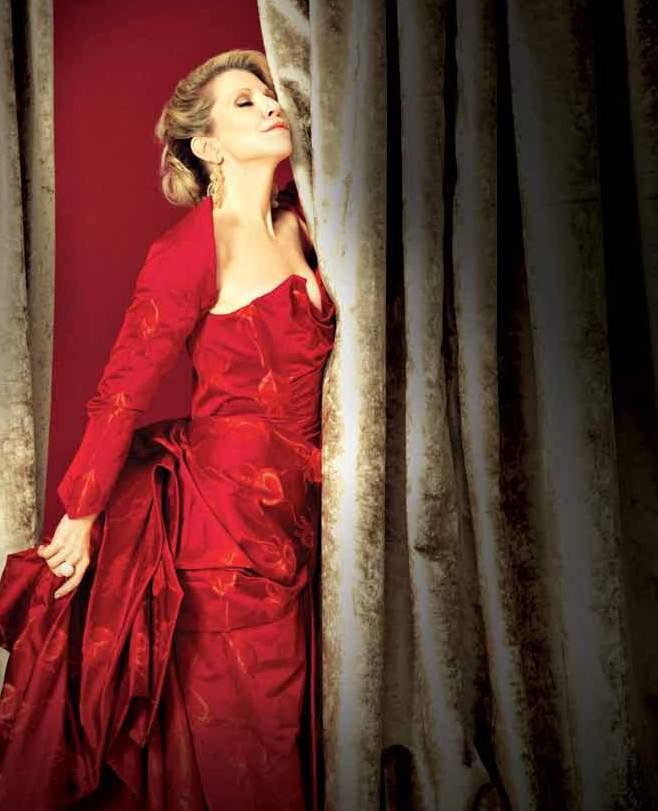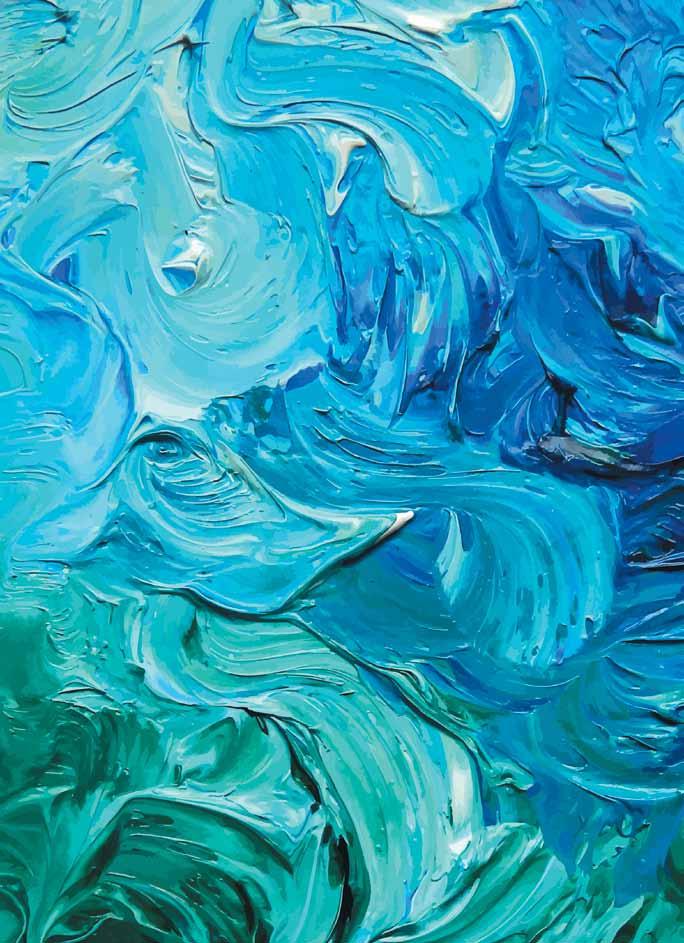聲音劇場 Theatre of Voices
《新與舊的家庭觀》
Family Values – Old and New
25.3.2015
演出長約 1 小時 35 分鐘,包括一節中場休息
Running time: approximately 1 hour and 35 minutes including one interval
節目資料 P22 for programme details
《帕特80 x 8》慶祝帕特80生辰音樂會
Arvo Pärt – 80 by 8 Pärt at 80 celebration concert
26.3.2015
香港大會堂音樂廳
演出長約 1 小時 30 分鐘 ,包括一節中場休息
Running time: approximately 1 hour 30 minutes including one interval
節目資料 P43 for programme details
Concert Hall, Hong Kong City Hall
Hong Kong Arts Festival wishes to thank Cathay Pacific Airways Limited for providing the Business Class flight ticket of Mr Paul Hillier of Theatre of Voices.
香港藝術節感謝國泰航空有限公司提供聲音劇場保羅.希利亞的商務艙機票。
contempora ry music DK
supports the international travel of selected Danish artists of the Theatre of Voices supports the Theater of Voices by an annual grant for administration ( not musician fees)
封面照片 Cover photograph © Ditte Capion & Mathias Bojesen
www.hk.artsfestival.org
網上追蹤香港藝術節 Follow the HKArtsFestival on
敬請關掉所有響鬧及發光裝置。
Please switch off all sound- making and light- emitting devices.
請勿擅自攝影、錄音或錄影。 Unauthorised photography or recording of any kind is strictly prohibited.
本場刊採用環保紙張印刷。Thisprogrammeisprintedonenvironmentallyfriendlypaper
聲音劇場
Theatre of Voices
藝術總監 / 指揮 Artistic Director / Conductor
保羅.希利亞 Paul Hillier
女高音 Sopranos
艾爾斯.托普 Else Torp
凱特.馬可博伊 Kate Macoboy
女中音 Mezzo- Soprano
西格妮.阿斯穆森 Signe Asmussen
假聲男高音 Countertenor
丹尼爾.卡爾森 Daniel Carlsson
男高音 Tenors
克里斯多夫.華生 Christopher Watson
尤里安.伯哲爾 Julian Podger
男低音 Bass
傑弗里.列德威治 Jeffrey Ledwidge
威廉.剛特 William Gaunt
管風琴 Organ
艾倫.拉斯穆森 Allan Rasmussen
聲音劇場
Theatre of Voices
聲音劇場由保羅.希利亞在 1990 年建立, 現已是歐洲的頂尖聲樂組合之一。目前計 劃涵蓋 17 世紀布克斯特胡德的作品,以 及多位現今最傑出的作曲家的作品,包括 貝里奧、帕特、萊克、卡治及古默森-霍 姆葛林等。
樂團經常於愛丁堡藝術節、巴比肯中心及 卡內基音樂廳演出。大衛•朗的《賣火柴 的小女孩受難曲》就是在卡內基音樂廳 首演,這部為聲音劇場創作的作品獲得 2008 普立茲獎,其錄音並獲 2010 格林美 獎。憑 2007 年的錄音《Stimmung》(哥 本哈根版本),樂團獲邀於 2008 柏林音 樂節開幕演出。2009 年,樂團於巴比肯 中心及哥本哈根皇家歌劇院,演出中國作 曲家劉索拉的新作。過去幾年曾於多國巡 演,包括澳洲、瑞典、英國、墨西哥、丹 麥、美國、意大利、法國、波蘭、比利時、
Theatre of Voices was founded by Paul Hillier in 1990 and is widely recognised as one of Europe’s foremost vocal groups. Current projects include music ranging from Buxtehude to many of today’s most eminent composers such as Luciano Berio, Arvo Pärt, Steve Reich, John Cage and Pelle Gudmundsen-Holmgreen.
The group regularly performs at Edinburgh Festival, Barbican Centre and Carnegie Hall – where they premiered David Lang’s the little match girl passion. The piece was commissioned for Theatre of Voices and won the 2008 Pulitzer Prize. The recording won a Grammy Award in 2010. Theatre of Voices’ 2007 recording of Stockhausen’s Stimmung (Copenhagen Version) led to the invitation to open the 2008 Berliner Festspiele at the composer’s own request. In 2009 the ensemble presented a new production by Chinese composer Liu Sola at the Barbican Centre and at the Royal Opera in Copenhagen. The past few years have included tours to Australia, Sweden, UK, Mexico, Denmark, the US, Italy, France, Poland, Belgium, Germany, Portugal, Holland and Ireland. Theatre of Voices was nominated for Nordic Council Music Prize 2013.
© Lars.BjarnÃ
德國、葡萄牙、荷蘭以及愛爾蘭。聲音劇 場更獲提名 2013 年北歐理事會音樂大獎。
聲音劇場與多位頂尖樂手合作,經常與克 諾斯四重奏合作(2009 年於巴比肯中心 史提夫.萊克音樂節首演格溫.布利亞斯 的《石拱》)。他們亦與倫敦小交響樂團 合作舉行音樂會,以及錄製丹麥作曲家古 默森-霍姆葛林的一系列作品。
最近,樂團參與了多場精采演出,公演地 點包括比利時根特、德國萊茵聲樂節及盧 薩蒂亞夏季音樂節、倫敦伊莉莎伯女王大 廳,以及紐約卡內基音樂廳(施托克豪森 的《Stimmung》)。
聲音劇場曾推出多張唱片,最新作品《造 物主之靈》(世界和聲唱片公司),收錄 帕克的室樂作品,廣獲好評;《聖誕故事》 (世界和聲唱片公司)改編自傳統聖誕崇 拜:九堂課與頌歌。樂團亦為世界和聲唱 片公司錄製了大衛•朗的《賣火柴的小女 孩受難曲》、施托克豪森《Stimmung》、 貝里奧的作品、多位當代作曲家的作品 (《故事》)及《倫敦的呼喊》(英國文 藝復興音樂)。此外,樂團亦為達卡波 唱片公司錄製了布克斯特胡德的北歐清唱 劇,為五張系列唱片的第一張。2014 年, 樂團推出錄音《布克斯特胡德的圈子》, 以及古默森-霍姆葛林根據杜蘭特的《眼 淚》所改編的作品。
中譯 王翠屏
Theatre of Voices works with some of the finest instrumentalists. They are working regularly with the Kronos Quartet (2009 premiere of Gavin Bryars’s The Stone Arch at Barbican Centre’s Steve Reich Festival). They have been working with London Sinfonietta on a concert and recording series of music by Danish composer Pelle Gudmundsen-Holmgreen.
Recent highlights include concerts in Ghent, at the German festivals RheinVokal and Lausitzer Musiksommer, at the Queen Elizabeth Hall London as well as at Carnegie Hall New York (Stockhausen's Stimmung).
Theatre of Voices has recorded numerous CDs. The latest discs include the highly praised recording Creator Spiritus (Harmonia Mundi) with chamber music works by Arvo Pärt and the recording of The Christmas Story (Harmonia Mundi) based on the traditional Christmas service Nine Lessons and Carols. For Harmonia Mundi the ensemble recorded David Lang’s the little match girl passion, Stockhausen’s Stimmung, works by Luciano Berio and other contemporary composers (Stories) and Cries of London (English renaissance music). On Dacapo-Records Theatre of Voices has released Buxtehude’s Scandinavian Cantatas – the first in a series of five recordings. Their 2014 releases include a recording of the programme Buxtehude and His Circle, and a CD with pieces by Pelle Gudmundsen-Holmgreen based on Dowland's Lacrimae
保羅.希利亞
Paul Hillier
希利亞致力發展聲樂團, 1973 年創立希利亞 合唱團並擔任總監,將男聲四重唱藝術推至 顛峰,獲得世界認可。 1990 年,他移居加 州,成立聲音劇場,利用迥異的歌手和樂器 開拓更寬廣的音樂風格。在加州大學戴維斯 分校任教期間,他舉辦了每年一度的聲音藝 術節,與美國世界和聲唱片公司有長期合作 關係,並在牛津大學出版社出版了一本關於 帕特的著作。
1996 至 2003 年間,希利亞擔任印第安納大 學早期音樂研究所的總監。 2001 年,他獲 委任為愛沙尼亞愛樂室內合唱團的首席指 揮。隔年,他移居丹麥,成為哥本哈根新藝 術合唱團的首席指揮,一直工作至今。希利 亞指揮的管弦及合唱樂團演出遍佈世界各 地,他在擔任指揮的同時編寫了史提夫.萊 克的一系列音樂著作,於 2004 年由牛津大 學出版社出版。 2008 年,他成為愛爾蘭國 立室內合唱團的首席指揮,並獲委任為波爾 圖音樂廳的藝術總監。同年,他成立「聲音 劇場」音樂發行公司。
2006 年,希利亞獲頒大英帝國勳章,以認 可他對聲樂藝術的貢獻。翌年,他獲得愛沙 尼亞白星勳章,並憑帕特的《平安》奪得格 林美最佳合唱錄音獎。其後,他以大衛.朗 的專輯《賣火柴的小女孩受難曲》於格林美 再下一城。 2009 / 2010 樂季,他成為耶魯大 學聖樂學院的駐團藝術家,在哥本哈根皇家 歌劇院及巴比肯中心等場地演出。2012 年, 希利亞於九年內第七次角逐格林美獎,以哥 本哈根新藝術合唱團及佩勒.古德蒙森-霍 姆葛林的作曲獲得提名。 2013 年,他更獲 丹麥女王瑪格麗特頒授騎士榮譽丹麥國旗勳 章。
藝術總監 / 指揮
Artistic Director / Conductor
中譯 陳逸宜
Hillier specialises in vocal groups. In 1973 he founded and directed the Hilliard Ensemble, taking the malevoice quartet to the peak of international recognition. In 1990 he moved to California and created the Theatre of Voices, to explore a greater range of musical styles using a more flexible cast of singers and instrumentalists. While teaching at the University of California, Davis, he presented an annual Festival of Voices and began a long association with Harmonia Mundi USA, and wrote a book about Arvo Pärt for Oxford University Press.
From 1996 to 2003 Hillier was Director of the Early Music Institute at Indiana University. In 2001 he was appointed Principal Conductor of the Estonian Philharmonic Chamber Choir. In 2003 he moved to Denmark and became, and remains, Chief Conductor of Ars Nova Copenhagen. While with both orchestra and choral conducting worldwide, Hillier edited a collection of Steve Reich’s writings on music, which was published by the Oxford University Press in 2004. In 2008 he became Chief Conductor of the National Chamber Choir of Ireland and was appointed artistic director of the Coro Casa da Musica in Porto. Also in 2008 he created his own music publishing company –Theatre of Voices Edition.
In 2006 Hillier was awarded an OBE for services to choral music. In 2007 he received the Order of the White Star of Estonia, and was awarded a Grammy for Best Choral Recording ( Da Pacem – Arvo Pärt). He received another Grammy Award for the David Lang's CD the little match girl passion . During the 2009/2010 season he was artist in residence at Yale University’s Institute for Sacred Music, and performed in at the Royal Opera in Copenhagen, the Barbican Centre in London, among other venues. In the 2012 Grammy Awards show Paul Hillier was competing for the seventh time in nine years, nominated with the Ars Nova Copenhagen and music by Pelle GudmundsenHolmgreen. In 2013 he was awarded the Order of Dannebrog – the Danish knighthood – by Her Majesty, Queen Margaret of Denmark.
卡利西密
《亞伯拉罕與以撒》
歌者:
說書人
25.3.2015
《新與舊的家庭觀》
Family Values – Old and New
尤里安.伯哲爾
神靈 威廉.剛特
以撒 艾爾斯.托普
亞伯拉罕 克里斯多夫.華生
天使 丹尼爾.卡爾森
管風琴通奏低音 艾倫.拉斯穆森
費斯可巴第
《羅曼斯卡詠嘆調組曲》
管風琴獨奏 艾倫.拉斯穆森
卡利西密
《耶弗大》
歌者:
耶弗大 尤里安.伯哲爾
菲利亞
艾爾斯.托普
歌者 II 凱特.馬可博伊
歌者 III
西格妮.阿斯穆森
假聲男高音 丹尼爾.卡爾森
男低音 威廉.剛特
管風琴通奏低音 艾倫.拉斯穆森
Giacomo Carissimi (1605-1674)
Historia di Abraham et Isaac (c.1650)
Singers:
Historicus Julian Podger
Deus William Gaunt
Isaac Else Torp
Abraham Christopher Watson
Angelus Daniel Carlsson
Organ continuo Allan Rasmussen
Girolamo Frescobaldi (1583-1643)
Partite sopra l'aria di Romanesca (1637)
Organ solo Allan Rasmussen
Giacomo Carissimi
Jephte (c.1650)
Singers:
Jephte Julian Podger
Filia Else Torp
Cantus II Kate Macoboy
Cantus III Signe Asmussen
Altus Daniel Carlsson
Bassus William Gaunt
Organ continuo Allan Rasmussen
中場休息 Interval
大衛.朗
《賣火柴的小女孩受難曲》
改編自安徒生、保利、彼康德及聖馬太
〈來吧,女兒〉
〈冰寒刺骨〉
〈摯愛的心肝〉
〈破舊的圍裙〉
〈懺與悔〉
〈光照耀着〉
〈耐心,給點耐心!〉
〈啊!也許〉
〈神啊,求祢大發慈悲〉
〈她又擦亮一根火柴〉
〈六時〉
〈她又點了根火柴〉
〈當我要走的時候〉
〈黎明之際〉
〈我們哭坐着〉
歌者:
艾爾斯.托普、西格妮.阿斯穆森、克里
斯多夫.華生、傑弗里.列德威治
David Lang (1957-)
the little match girl passion (2007)
After HC Henderson, HP Paulli, Picander and Saint Matthew.
Come, daughter It was terribly cold Dearest heart
In an old apron Penance and remorse Lights were shining Patience, patience! Ah! perhaps Have mercy, my God She lighted another match From the sixth hour She again rubbed a match When it is time for me to go In the dawn of morning We sit and cry
Singers: Else Torp, Signe Asmussen, Christopher Watson and Jeffrey Ledwidge
《新與舊的家庭觀》
是晚演出曲目及次序或有更改
Pieces and their order of performance are subject to change
文 : 保羅.希利亞
Family Values – Old and New Text: Paul Hillier
是次演出的曲目選自 17 及 21 世紀的音 樂,然而三首聲樂作品卻有強烈的共通之 處,都是父母與子女之間的故事。兩首卡 利西密的作品所談的犧牲,並非指現代社 會中家長為子女作的付出,而是兩個父親 因為勢所逼,需要以子女作祭品。《亞伯 拉罕與以撒》的結局完滿收場,得以免卻 獻祭,而《耶弗大》的主角卻逃不掉獻祭 的命運。這故事在現代觀眾眼中是一場悲 劇,很多人對於耶弗大為信守誓言而犧牲 女兒的做法都不認同,可惜時至今日,有 些地方仍會發生類似的事情。
《賣火柴的小女孩受難曲》取材於安徒生 於 150 年前寫的故事,相比之下卻充滿當 代的苦澀。女孩因父母的冷漠、絕情和自 私而犧牲,唯一的救贖不是來自宗教,而 是賣火柴的女孩在幻覺中看見祖母出現, 在她暈倒並凍死前的一刻給她一點安慰。
三首作品的另一共通之處,就是都可稱為 神劇。幾年前我開始委約不同的作曲家, 用聲樂小組進行創作,讓他們敘述一個故 事;歌者除了各自扮演一角之外,也會作 旁白,並不時一起合唱介紹或對旁白評 述。
我想嘗試藉此復興神劇原來的形式,但如 今為現代社會重新創作,歌者大多以音樂 會形式公開演唱。因此,過程中很自然會 將其中一首新作(大衛.朗的作品)與卡 利西密的兩首早前神劇作品合在一起。
當然,後來神劇的規模愈來愈大:有人會 想起韓德爾的《彌賽亞》、巴赫的《受難 曲》,以及之後兩個世紀很多寫給獨奏 家、合唱團及樂團的作品。不過,17 世紀 初的神劇主要是宗教崇拜用的室樂,在舉
Although this concert features music from the 17th and 21st centuries, all three vocal works in it have strong elements in common. Thematically they each tell a story about parents and their children. The two Carissimi works focus on sacrifice – not the modern concept of parents “making sacrifices” for their children, but about fathers placed in a position where they must actually offer their own child for sacrifice. In Abraham and Isaac the sacrifice is averted; the tale is thus a happy one. In Jephte it is not averted, and for a modern audience the story is pure tragedy – most of us will have little sympathy for Jephte’s resolution in honouring his vow, even though there are cultures today in which such extreme events still occur.
By contrast, the little match girl passion feels bitterly contemporary, although it is based on a tale by Hans Christian Andersen written 150 years ago. Here a daughter is sacrificed by her parents out of sheer neglect and loveless selfishness. The only element of redemption comes, not from any religious sentiment, but from the match girl’s vision of her grandmother, which comforts her as she falls into a coma and freezes to death.
But the three works share something further in that they may be called oratorios. A few years ago I started commissioning new works from various composers, asking them to tell a story, and to use a small group of singers who take individual roles, but who also narrate, and at various moments join together as a chorus to introduce or comment upon the narrative.
In this way I was seeking deliberately to revive the original model of the oratorio, but now reconceived for the modern secular world in which singers primarily give public concerts. It is therefore a very natural step in this process to unite one of these new works (David Lang’s) with two of Carissimi’s oratorios from the early period of oratorio composition.
Eventually, of course, oratorios became much larger in scale: one thinks of Handel’s Messiah, the Bach Passions, and the many substantial works over the next two centuries for soloists, choir, and orchestra. But the early
行祈禱聚會的建築物中(特別是羅馬)演
出,這些建築物稱為「禮拜堂」。卡利西
密(1605 至 1674 年)獲廣認為是早期最 重要的神劇作曲家,而首位重要的神劇作 曲家是阿內利奧(約 1567 至 1630 年)。
阿內利奧是柏勒斯替那的學生,他為聖斐 立尼利(1515 至 1595 年)在羅馬建立的 禮拜堂以對話的形式創作朗誦式的作品。
大衛.朗在 2008 年憑《賣火柴的女孩受 難曲》獲普立茲獎,而我們製作的錄音亦 獲得 2010 年格林美獎。我會請大衛.朗
來介紹他自己的作品(見 P28)。
中譯 王翠屏
17th century oratorio was essentially devotional chamber music, performed (particularly in Rome) at buildings reserved for prayer meetings – called “oratorios”. Giacomo Carissimi (1605-74) is widely regarded as the most important early composer of oratorios, though it would be fair to say that the first significant composer in the genre was G. F. Anerio (ca.1567-1630). Anerio was a pupil of Palestrina, but embraced the new declamatory style in dialogues expressly written for the oratorio established in Rome by St Philippe Neri (1515-95).
I will leave David Lang to introduce his own work (P28), but note with pleasure that he was awarded the Pulitzer Prize for the little match girl passion in 2008, and our recording of it received a Grammy in 2010.
卡利西密 :《亞伯拉罕與以撒》
Carissimi: Historia di Abraham et Isaac
費斯可巴第 :《羅曼斯卡詠嘆調組曲》
Frescobaldi: Partite sopra l’aria di Romanesca
卡利西密 :《耶弗大》 Carissimi: Jephte
作為天主教信仰的中心點,羅馬自古以來 一直孕育着一眾優秀演奏家及作曲家。卡 利西密生於這座「永恆之城」,一生並未 離開。身為耶穌會宗座德國及匈牙利學院 的合唱堂長,他曾為修院的聖亞坡理納教 堂創作多首樂曲。教宗克萊蒙特 14 世於 1773 年打壓耶穌會後,多份卡利西密手稿 已然遺失,幸好他門生眾多,才能保存部 分樂曲而流傳到歐洲各處,這亦反映出他 在當時絕對是一位受歡迎的成功音樂家。
費斯可巴第被公認為早期巴羅克時期出色 的鍵盤音樂作曲家及對位法大師。他生於 意大利北部城市費拉拉,曾在布魯賽爾逗 留一段短時間,大約於 1607 年抵達羅馬; 一年之後以 25 歲之齡成為聖彼得大教堂 管風琴師,擔任此職直至逝世,生前他亦 有其他職務在身。
卡利西密對拉丁文神劇的貢獻是他一生中 重要的成就之一。在當時來說,這種新曲 式只會在大齋節期使用,所選經文的主旨 主要有關受難與救贖。除此之外,神劇與 歌劇曲式極為相似,宣敘調、詠嘆調和詠 敘調的運用較為隨意。宣敘調用作敘述事 件,合唱則用作闡述劇中的普羅大眾感 想。
亞伯拉罕與以撒的故事取材自《聖經》 舊約的創世紀第 22 章,講述上帝指命亞 伯拉罕要犧牲他的小兒子以撒來獻給上 帝,這段故事從古至今由史達拉汶斯基到 鮑勃 • 迪倫已被編寫無數次。故事中,
As the centre of the Catholic Church, Rome has for centuries been home to many of the world’s finest performers and composers. Giacomo Carissimi was born in the “Eternal City” and remained there throughout his life. As maestro di cappella of the Collegio Germanico e Ungarico, a Jesuit seminary, he composed many of his works for the seminary’s church, Sant’Apollinare. After the suppression of the Jesuits by Pope Clement XIV, in 1773, many of Carissimi’s manuscripts were lost or dispersed to other parts of Europe. Fortunately, he attracted numerous students who helped to preserve his works and show him to have been among the most successful musicians of his time.
Girolamo Frescobaldi is recognised as one of the early Baroque’s great composers of keyboard music and a master of contrapuntal technique. He was born in the city of Ferrera, in the north of Italy. After a brief stay in Brussels, he arrived in Rome in about 1607 and a year later, at the age of 25, he was appointed organist at St. Peter’s – a position he would retain until his death, while taking on many additional titles.
Carissimi’s contributions to the Latin oratorio are seen as being among his most important achievements. Given that this new musical form was intended primarily for performance during Lent, the stories selected were often on themes of suffering and redemption. Otherwise, oratorios had much in common with opera, with relatively free use of recitative, aria and arioso. Recitative was used mostly to narrate events. The chorus often elaborated on the emotions of the general population.
The story of Abraham and Isaac (from the “Book of Genesis”, chapter 22), in which God command’s Abraham to sacrifice his son, Isaac, has been the subject of innumerable settings – from Stravinsky to Bob Dylan. In the story, Abraham tells Isaac only that God has asked for
亞伯拉罕只告訴以撒說上帝需要祭品,他
們便一同帶柴火上山。正當亞伯拉罕想要 動手殺死以撒之際,上帝差遣天使到來阻 止,並告訴他上帝已清楚他是忠誠信服的 義人。
風格上,卡利西密的《亞伯拉罕與以撒》
(約 1650 年) 跟他其他的拉丁文神劇非
常相似,除了亞伯拉罕的延後登場。一開
始說書人(旁白歌者)作出簡介,然後上 帝(男低音)唱出對亞伯拉罕要求之事, 說書人則只描述亞伯拉罕的反應。其後以 撒對其父親的信任是全劇高潮所在,亞伯 拉罕想下手時他仍天真的以大調演唱,詢 問獻祭的羔羊在何方。接着的父子對談,
卡利西密不但轉用小調,更用嘆息法, 在句子中甚至每個字的音節中加上休止停 頓,來強調兩人的情感。天使阻止事情發 生之後,合唱團則化身成傳教士,以剛才 的故事為例唱出教誨。
費斯可巴第將《羅曼斯卡詠嘆調組曲》收
錄進他晚期出版的鍵盤曲集(1637 年) 中。「羅曼斯卡」是一種旋律暨和聲法, 常被意大利作曲家創作變奏曲時採用。音 樂說書人哲比諾指出,雖然最初的「羅曼 斯卡」旋律模進來自西班牙,其出處已不 可究,但名字則顯示出跟羅馬會有某程度 上的關聯。
跟亞伯拉罕與以撒不同,耶弗大的遭遇下 場實在悲慘。《耶弗大》(約 1650 年) 故事取材自士師記第 11、12 章。耶弗大是 一妓女之子,成年後終被逐出父親家門, 成為了流氓頭目,但當亞捫人攻打基列族 時,他又被召回成為元帥帶領族人對抗。
此前他提出條件,如果戰勝,他要做基列 人的領袖。然後他跟上帝許願說,如上帝 能助他打勝這場仗,他會將第一個從家門 出來迎接他的人獻上。怎料事成後,第一 個出來迎接他的是其獨生女兒菲莉雅。
a sacrifice, and they set off together with firewood. Just as Abraham is about to follow through on his promise, an angel intervenes, informing him that God now knows he is faithful to him.
Stylistically, Carissimi’s Historia di Abraham et Isaac (c.1685) shares many characteristics with the composer’s other Latin oratorios. Somewhat unexpected is the delayed entrance of Abraham. The work opens with a brief statement from Historicus, before God (bass) enters with his call to Abraham, whose reaction is described by Historicus. Isaac’s trust in his father provides the oratorio’s poignant climax, when, as Abraham is about to slay him, he naively sings in major mode, asking where the lamb is that they will offer to God. In the dialogue between father and son that follows, Carissimi not only turns to the minor mode, but emphases the emotion through the use of suspiratio, the dramatic placement of rests within phrases and even within individual words. Following the angel’s intervention, the chorus acts as preacher, commenting on the events we have witnessed.
Frescobaldi included the Partite sopra l’aria di Romanesca in his 1637 collection of keyboard works, one of his final publications. The “Romanesca” in question is a melodic-harmonic formula that became a popular starting point among Italian composers for variation forms. As music historian Giuseppe Gerbino has written, although the earliest examples of the Romanesca melodic sequence are Spanish, its origin is not known with certainty and its name suggests a connection with Rome.
Unlike the story of Abraham and Isaac, Jephte (c.1650) has no happy ending. Adapted from the “Book of Judges”, chapters 11 and 12, the story tells of Jephte, the son of a prostitute, who has become a kind of crime boss after being expelled from his father’s home. When the Ammonites invade, Jepthe is called on to lead the war effort against them. He agrees on the condition that if successful he be allowed to remain as a prince. He then makes a pact with God, agreeing that if God aids his victory against the Ammonites, he will give in return the first person he sees on his return home. To his horror, that person who greets him is his only daughter, Filia. The oratorio opens with the narrator, Historicus, setting the scene before Jephte enters with his vow to God that
神劇開首亦是由飾演說書人的歌者旁白作 簡介,帶出耶弗大向上帝誓願祈望戰爭勝 利,同時也不自覺地決定了女兒的命運。 合唱團跟着演唱描繪戰爭場面,隨之以卡 農形式對唱帶出動作場面,男低音獨唱唱 出上帝施以援手。得到勝利後,說書人再 次出現帶領菲莉雅登場。緊接着的父女對 談充分表現出菲莉雅的哀慟 (唱「死時 仍是處女」),但最終仍接受命運的安排, 成為祭品被焚。
傳統上這故事的寓意就是耶弗大有遵守約 定,真的有將他的女兒作為祭品獻給上 帝。近代的詮釋則着意淡化上帝不寬恕 的一面,耶弗大要為他倉促的誓言付出代 價。卡利西密版本之戲劇性及哀愁側重對 菲莉雅的描寫。在劇目最後一段「哭泣 吧,以色列的子民」裏,卡利西密將菲莉
雅堅忍地接受與以色列的哀痛作出對比 菲莉雅用穩定的節奏歌唱到末段時, 不諧和音漸漸增多,以表達人民的悲傷。
樂曲介紹 拜恩.湯臣
中譯 鄭瑋菁
will both secure victory and seal his daughter’s fate. The chorus then tells of the war’s beginning, followed by a pair of voices, in canon, describing the action, and a bass soloist who sings of God’s decisive assistance. The battle won, Historicus re-enters, setting up the fateful appearance of Filia. The dialogue between father and daughter ensues, with Filia bemoaning her fate (“to die a virgin”) but ultimately accepting that she must be burnt as an offering to God.
The traditional explanation for this moral is that indeed his daughter is the human sacrifice demanded by God for his service to the Israelites. More recent interpretations, disdaining such an unforgiving God, have looked to Jephte’s rash vow as the story’s moral. The drama and pathos of Carissimi’s interpretation comes largely from his emphasis on Filia. In the final section, “Plorate, filii Israel” (“Weep, ye children of Israel”), he contrasts Filia’s stoic acceptance of her fate with the Israelites’ grief. Filia’s steady rhythm continues into the final chorus but combined with increasingly dissonances that express the people’s sorrow.
Programme notes by Brian Thompson
大衛.朗:《賣火柴的小女孩受難曲》
文:大衛.朗 Lang: the little match girl passion
我想講一個故事,一個特別的故事,就是 丹麥作家安徒生的《賣火柴的小女孩》。
原著表面上是寫給孩子看的,卻如不少著 名的童話故事一樣,包含着險惡和道德。
一個可憐女孩遭父親虐打,在街上賣火柴 卻無人問津,結果凍死街頭。儘管女孩始 終堅持純潔的基督教精神,但故事本身卻 說不上是美好動聽。
《賣火柴的小女孩》吸引着我,因為故事 的力量不在於情節,而是在於故事處處都 由充滿了恐怖和美好事物的對立。女孩的 悲苦的現況和她甜蜜的過去的對比,她的 窮困和她的盼望的反差,故事總在苦難與 希望之間形成一種單純的平衡。
這故事有很多演繹方法,可以令人信服地 把它當作關於信念的故事,也可以把它當 作關於貧窮的寓言。我感興趣之處是安徒 生將之演繹為一種比喻,女孩受苦、遭群 眾指罵、死去並變形,女孩與基督的受難 在信仰及道德的層面形成對等。我開始懷
疑,若然將故事的基督教本質推論並揭示 出來,正如基督徒作曲家傳統上處理耶穌 受難音樂時的做法,到底會發現甚麼秘 密。
受難曲最引人入勝之處是它的文字比故事 本身還多。這些文字來自群眾的反應、悔 罪,以及一般傷痛、震驚和懊悔的流露。
這是崇拜的指示,引導我們對故事的反 應,令觀眾從旁觀者的身份投入至台上的 慘劇中。這些反應可以有很多種 在巴 赫的《馬太受難曲》中,這些額外的文字
Text: David Lang
I wanted to tell a story. A particular story, in fact, the story of The Little Match Girl, by the Danish author Hans Christian Andersen. The original is ostensibly for children, and it has that shocking combination of danger and morality that many famous children’s stories do. A poor young girl, whose father beats her, tries unsuccessfully to sell matches on the street, is ignored, and freezes to death. Through it all she somehow retains her Christian purity of spirit, but it is not a pretty story.
What drew me to The Little Match Girl is that the strength of the story lies not in its plot but in the fact that all its parts – the horror and the beauty – are constantly suffused with their opposites. The girl’s bitter present is locked together with the sweetness of her past memories, her poverty is always suffused with her hopefulness. There is a kind of naive equilibrium between suffering and hope.
There are many ways to tell this story. One could convincingly tell it as a story about faith, or as an allegory about poverty. What has always interested me, however, is that Andersen tells this story as a kind of parable, drawing a religious and moral equivalency between the suffering of the poor girl and the suffering of Jesus. The girl suffers, is scorned by the crowd, dies and is transfigured. I started wondering what secrets could be unlocked from this story if one took its Christian nature to its conclusion and unfolded it, as Christian composers have traditionally done in musical settings of the Passion of Jesus.
The most interesting thing about how the Passion story is told is that it can include texts other than the story itself. These texts are the reactions of the crowd, penitential thoughts, statements of general sorrow or shock or remorse. These are devotional guideposts, the markers for our own responses to the story, and they have the effect of making the audience more than spectators to the sorrowful events onstage. These responses can have a huge range – in Bach’s Saint Matthew Passion these extra texts range from famous chorales that his congregation
涵蓋由會眾和唱著名的讚美詩,到完全虛 構的人物如「錫安的女兒」和「信徒的和 唱」等。受難曲在說故事之餘加入評論, 這手法將觀眾帶到劇情之中,為旁白賦予 了言之必然的力量。
我的作品《賣火柴的小女孩受難曲》以安 徒生的《賣火柴的小女孩》為背景,採用 巴赫的《馬太受難曲》的形式,穿插着安 徒生的旁述、我對群眾的演繹和巴赫的角 色回應。作品的文字來自我、安徒生、保 利(1872 年,這故事的首個英文譯者)、 彼康德(巴赫的劇作者亨里奇的筆名), 以及聖馬太的福音。「Passion」在拉丁 文解作受難。我的作品中沒有巴赫,也沒 有耶穌,只有賣火柴的女孩在受苦,她取 代了耶穌的受難,(我希望)能將她痛苦 的情感提昇到一個更高層次。
樂曲介紹 大衛.朗 中譯 王翠屏
was expected to sing along with to completely invented characters, such as the “Daughter of Zion” and the “Chorus of Believers”. The Passion format – the telling of a story while simultaneously commenting upon it – has the effect of placing us in the middle of the action, and it gives the narrative a powerful inevitability.
My piece is called the little match girl passion and it sets Hans Christian Andersen's story The Little Match Girl in the format of Bach's Saint Matthew Passion, interspersing Andersen's narrative with my versions of the crowd and character responses from the Bach. The text is by me, after texts by HC Andersen, HP Paulli (the first translator of the story into English, in 1872), Picander (the nom de plume of Christian Friedrich Henrici, the librettist of the Bach), and the Gospel according to Saint Matthew. The word “passion” comes from the Latin word for suffering. There is no Bach in my piece and there is no Jesusrather the suffering of the Little Match Girl has been substituted for Jesus', (I hope) elevating her sorrow to a higher plane.
Programme notes by David Lang
大衛 朗的作曲作品在當今美國倍受青睞。 他憑《賣火柴的小女孩受難曲》獲得 2008 年普立茲音樂獎,該作品取材於安徒生的童 話,並由大衛 朗為巴赫的《馬太受難曲》 重寫歌詞。他由世界和聲唱片公司的錄音作 品於 2010 年獲得格蘭美獎最佳小樂團表演
獎。此外,他亦獲得羅馬獎、法國國家藝術 與文學騎士勳章,並獲《音樂美國》雜誌評 為 2013 年度最佳作曲家。
朗氏作為卡內基音樂廳 2013 / 2014 年的駐廳 作曲家,在其故事集音樂節中,以不同手 法用音樂講述故事。他為不少機構和樂團作
曲,包括聖蓋茲賀音樂廳的十週年音樂會上 首演的弦樂四重奏,坦戈塢音樂中心 75 週 年音樂會的合唱作品, musikFabrik 樂團的新 作以及班堡交響樂團的新作。近期亦為中世
紀三重唱以及薩爾塔雷洛三重唱創作了《就 在(歌中的雅歌之後)》。 2014 / 2015 年在 鹿特丹多倫音樂廳擔任駐場作曲家時,大
衛.朗以寬廣的創作範疇著稱,當中不少作 品在歐洲首演。
朗氏的作品常為世界各地著名芭蕾舞和現代 舞編舞家如崔拉.莎普和蘇珊.馬歇爾等人 的作品配樂。他配樂的電影作品包括獲獎紀 錄片《伍德曼一家》,保羅.索倫蒂諾執導
的奧斯卡獲獎作品《羅馬浮世繪》及其即將 上演的新作《青春》。朗氏是紐約的樂侃群 星音樂組合的聯合創辦人,亦是耶魯音樂學 院作曲系的教授。
中譯 王明宇
Lang is one of the most performed American composers writing today. He won the 2008 Pulitzer Prize in music for the little match girl passion, based on a fable by Hans Christian Andersen and Lang’s own rewriting of the libretto to Bach’s Saint Matthew Passion. The recording of the piece on Harmonia Mundi was awarded a 2010 Grammy Award for Best Small Ensemble Performance. He has also received the Rome Prize, Le Chevalier des Arts et des Lettres, and was Musical America's 2013 Composer of the Year.
Lang’s tenure as 2013/2014 Debs Chair Composer's Chair at Carnegie Hall saw his festival, collected stories, showcase different modes of storytelling in music. This season Lang sees the premieres of a string quartet for the 10th anniversary of Sage Gateshead, a choral piece for the 75th anniversary of Tanglewood Music Center, a new piece for musikFabrik, a new composition for the Bamberg Symphony, and just (after song of songs) for Trio Mediaeval and Saltarello. Lang’s compositional range is highlighted as the 2014/2015 Composer-inResidence at de Doelen in Rotterdam; many of the pieces receive their European premieres.
Lang’s music is used regularly for ballet and modern dance around the world by such choreographers as Twyla Tharp, Susan Marshall, and others. Lang’s film work includes the music for the award-winning documentary The Woodmans . His music is also on the soundtrack for Paolo Sorrentino’s Oscar-winning La Grande Bellezza and the director’s upcoming film, Youth . Lang co-founded New York's music collective, Bang on a Can and he is Professor of Composition at the Yale School of Music.
Historia di Abraham et Isaac (Genesis, cap. XXII, v. 1 – 18)
Historicus
Tentavit Deus Abraham, vocavit, et dixit ad eum:
Deus
Abraham! Abraham! Tolle filium tuum unigenitum Isaac quem diligis, et vade in terram visionis super unum montium quem monstravero tibi, et ibi illum offeres in holocaustum.
Historicus
Abraham ergo de nocte consurgens, parato ligno, sumpto gradio et igne, et strato apparatu, pergit ad locum quem illi Deus preceperat, um unigenito filio suo. Cumque illuc accessisset, tulit ligna holocausti, et imposuit super Isaac filium suum, qui ferens igne et gladium dicebat patri suo:
Isaac
Pater mi, ecce ignis, ecce ligna, ecce gladius et apparatus, ubi est holocausti victima?
Historicus
Tunc obruit dolor patris viscera, fremuit sanguis, horruit natura, et ingemeniscens pater ait:
Abraham Fili mI, heu, fili mi.
Isaac
Pater mi, pater mi, quid suspiras?
Abraham Heu, fili mi.
Isaac
Pater mi, quid suspiras? Pater mi, ubi est holocausti victima?
Abraham
Providebit Dominus holocausti victimam.
The Story of Abraham and Isaac (Genesis, cap. XXII, v. 1 – 18)
Narrator
To test Abraham God called him and said:
God
Abraham, take Isaac your only son, whom you love, and go into the land of visions and there offer him as a sacrifice on one of the mountains which I will show you.
Narrator
And Abraham rose up in the night and prepared wood, and took a knife and everything needed to make a fire, and went with his only born son to the place which God had told him.
And when he had arrived there, he took the wood for the sacrifice and laid it upon Isaac his son, who, carrying fire and a knife, said to his father:
Isaac
My father, here is the fire, here the wood, here the knife, and all that is needed; but where is the victim for the sacrifice?
Narrator
Then grief overwhelmed his father’s bowels, his blood raged, his spirit shuddered, and he groaned:
Abraham Oh my son, alas!
Isaac Father, why do you sigh like this?
Abraham Oh my son.
Isaac Father, why do you sigh? Where is the sacrificial victim?
Abraham God will provide the victim.
《亞伯拉罕與以撒》
(創世紀 22 1- 18)
說書人
為考驗亞伯拉罕,神呼喚他 說:
神
亞伯拉罕,帶你獨生的愛子 以撒,前往異象之地,在我 指定的山上把他獻給我作祭 品。
說書人
亞伯拉罕在晚上起來,預備 木柴、獻祭刀以及生火的工 具,帶他的獨子前往上帝指 示的地方。
他們到達時,亞伯拉罕把獻 祭用的木柴放在以撒身上。
帶着生火工具和獻祭刀的以 撒問父親:
以撒
父親,這裏有火、有木、有刀, 萬事俱備,但祭品呢?
說書人
亞伯拉罕滿肚愁腸、血脈賁 張、不寒而慄,他低聲說道: 亞伯拉罕 我的兒子,哎呀!
以撒
父親,你為何嘆氣?
亞伯拉罕 啊,我的兒子。
以撒
父親,你怎麼一路嘆氣?祭 品在哪?
亞伯拉罕 神自會預備祭品。
David Lang Composer
© Peter Serling
Historicus
Cumque Abraham aedificasset altare, ligna composuit, et alligavit filium Isaac unigenitum, arripuit gladium, extendit manum ad immolandum illum. Tunc ecce Angelus Domini de caelo clamans, qui dixit Abraham.
Angelus
Non extendas manum tuam super Isaac, neque illi quidquam facias, cognovi enim quod times Deum, et non pepercisti unigenito filio tuo propter me.
Abraham et Isaac
O felix nuntium, o dulce gaudium! Procul ignis, procul dolor! Procul ferrum; procul mors! Vivit pater, vivit infans.
Historicus
Vocavit et iterum Angelus Domini de caelo Abraham, et dixit ei:
Angelus
Quia fuisti mihi oboediens, et non pepercisti unigenito filio tuo propter me, benedicam tibi, et tuum semen multiplicabo sicut stellas caeli, et sicut arenam quae est in litore maris, et in semine tuo benedicentur omnes populi, omnes gentes, omnes generations.
Chorus
Omnes populi laudate Deum, omnes gentes, omnes generations, et adorate Dominum.
Abraham Qui misit Angelum suum de caelo, et eripuit Isaac dilectum de igne.
Angelus De gladio.
Bassus De morte.
Abraham, Angelus and Bassus Et de manu patris sui.
Chorus
Omnes populi laudate Deum, omnes gentes, omnes generationes, et adorate Dominum.
Narrator
When he had built an altar, and laid the wood in place, and bound his son, and taken up the knife to slay him, then behold, an angel of the Lord called out from heaven, and said to Abraham:
Angel
Do not lay a hand on your son nor do anything to him, for now I know that you fear the Lord and would not withhold your only son for my sake.
Abraham and Isaac O happy news! O sweet joy! Away fire, away pain, away iron, away death, the father lives, the child lives.
Narrator
And the angel of the Lord called a second time to Abraham and said to him:
Angel
Because you have obeyed me and did not withhold your only born son from sacrifice for me, I will bless you and multiply your seed like the stars in the sky, and like the sands on the seashore; and through your seed shall all people, all nations, all generations be blessed.
Chorus
All people, all nations, all generations, praise the Lord and adore him!
Abraham He who sent his angel from heaven, and has delivered Isaac his beloved out of the fire.
Angel From the knife.
Bass From death.
Abraham, Angel and Bass From the hand of his father.
Chorus
All people, all nations, all generations, praise the Lord and adore him!
說書人
當他建好祭壇,放置好木柴以
後,就把兒子綑起,舉起刀要 殺了他。突然天使從天而降, 阻止亞伯拉罕,神對他說:
天使
別傷害你的兒子,現在我知道 你對主的敬畏,就連自己獨生 的愛子也願意獻予我。
亞伯拉罕和以撒
大好消息!喜出望外!遠離火 焰、遠離苦痛、遠離鐵刃、遠 離死亡,父在子也在。
說書人
天使再次呼喚亞伯拉罕,對他 說道:
天使
因為你遵從我的指引,願意把 獨生子奉獻給我,我會祝福你, 讓你有萬子千孫,就如天上的 繁星,海邊的沙粒,你的後裔 會讓萬國萬民世代蒙福。
合唱
萬國萬民,世世代代,齊來頌 讚主、敬拜主!
亞伯拉罕
衪從天國派遣天使,拯救他摯 愛的以撒,好讓他遠離火焰。
天使 遠離刀刃。
低音 遠離死亡。
亞伯拉罕、天使和低音 遠離父親之手。
合唱
萬國萬民,世世代代,齊來頌 讚主、敬拜主!
Jephte
Historicus
Cum vocasset in proelium filios Israel rex filiorum Ammon et verbis Jephte acquiescere noluisset, factus est super Jephte Spiritus Domini et progressus ad filios Ammon votum vovit Domino dicens:
Jephte
Si tradiderit Dominus filios Ammon in manus meas quicumque primus de domo mea occurrerit mihi, offeram illum Domino in holocaustum.
Chorus
Transivit ergo Jephte ad filios Ammon, ut in spiritu forti et virtute Domini pugnaret contra eos.
Historicus II
Et clangebant tubae et personabant tympana et proelium commissum est adversus Ammon.
Basso Solo
Fugite, cedite impii, perite gentes, occumbite in gladio. dominus exercituum in proelium surrexit et pugnat contra vos.
Chorus
Fugite, cedite impii, corruite, et in furore gladii dissipamini.
Historicus
Et percussit Jephte viginti civitates Ammon plaga magna nimis.
Historicus III
Et ululantes filii Ammon facti sunt coram filiis Israel humiliati.
Historicus
Cum autem victor Jephte in domum suam reverteretur, occurens ei unigenita filia sua cum tympanis et choris praecinebat:
Jephte
Historicus
When the king of the children of Ammon had called the children of Israel into war and would not acquiesce to Jephtah’s words, the Spirit of the Lord came upon Jephtah, and after he had passed over unto the children of Ammon he vowed a vow unto the Lord and said:
Jephtah
If the Lord delivereth the children of Ammon into mine hands then shall I be that whatsoever first cometh forth of my house to meet me. will offer it to the Lord as a sacrifice.
Chorus
Thus Jephtah passed over unto the children of Ammon to fight against them with great courage and with the strength of the Lord,
Historicus II
And the trumpets flourished and the drums thundered and a battle was fought against Ammon.
Bass Solo
Flee, withdraw, ye impious, perish ye heathens, die under the sword. The Lord of the army riseth for the battle and fighteth against you.
Chorus
Flee, withdraw, ye impious, go to your ruin, and be dispersed under the fury of the swords.
Historicus
And Jephtah subdued twenty cities of Ammon with a mighty blow.
Historicus III
And weeping loudly, the children of Ammon were humiliated before the eyes of the children of Israel.
Historicus
When, however, Jephtah came unto his house as victor, his only daughter came out to meet ham with timbrels and dances and sang:
《耶弗大》
說書人
亞捫國王不肯接受耶弗大的 和談,堅持向以色列宣戰。 聖靈降於耶弗大身上,出戰 前夕,他對主發下誓願:
耶弗大 若主助我戰勝亞捫人,在回 歸之時,我會把第一個走出 家門迎接我的人獻為燔祭。
合唱 於是,耶弗大憑着主無比的 勇氣和力量,向亞捫人進軍。
說書人II
號角響起、戰鼓雷鳴,耶弗 大與亞捫人的戰鬥開始了。
低音獨唱
逃跑吧,撤退吧,不虔誠的 異教徒,你們統統會成為劍 下亡魂。
主帶領的大軍把你們擊潰。
合唱
逃跑吧,撤退吧,不虔誠的 異教徒,來面臨你們的末日, 劍刃的怒火會把你們燒盡。
說書人 耶弗大一口氣攻下了二十座 亞捫人的城池。
說書人III
亞捫人高聲嚎哭,亞捫的子 民在以色列人面前尊嚴掃地。
說書人 不料,耶弗大凱旋歸去的時 候,他獨生的女兒卻奏着鼓, 跳着舞走出家門唱道:
菲莉雅
奏起鼓、敲起鈸,為主頌唱 聖詩樂歌。
齊來讚美天國的君王,齊來 讚美主宰戰爭的上主。全靠 衪,以色列的元帥才能勝利 歸來。
Filia
Incipite in tympanis et psallite in cymbalis. Hymnum cantemus Domino et modulemur canticum.
Laudemus regem coelitum, laudemus belli principem, qui filiorum Israel victorem ducem redidit.
Chorus
Hymnum cantemus Domino et modulemur canticum, qui dedit nobis gloriam et Israel victoriam.
Filia
Incipite in tympanis et psallite in cymbalis. Hymnum cantemus Domino et modulemur canticum. Laudemus regem coelitum, laudemus belli principem, qui filiorum Israel victorem ducem redidit.
Chorus
Hymnum cantemus Domino et modulemur canticum, qui dedit nobis gloriam et Israel victoriam.
Historicus
Cum vidisset Jephte, qui votum Domino voverat, filiam suam venientem in occursum, prae dolore et lachrimis scidit vestimenta sua et ait:
Jephte
Heu mihi! filia mea, heu deceptisti me, filia unigenita, et tu pariter, heu filia mea, decepta es.
Filia
Cur ego te pater decepi et cur ego filia tua unigenita decepta sum?
Jephte
Aperui os meum ad Dominum ut quicumque primus de domo mea occurrerit mihi, offeram illum Domino in holocaustum. Heu mihi! filia mea, heu decepisti me, filia unigenita, et tu pariter, heu filia mea, decepta es.
Filia
Commence timbrels, and play cymbals.
Let us sing a hymn unto the Lord and utter a joyous song.
Let us praise the heavenly king, let us praise the lord of war, who returned the leader of the children of Israel to us in victory.
Chorus
Let us sing a hymn and utter a joyous song unto the Lord, who gave us glory, and victory unto Israel.
Filia
Sing with me unto the Lord, sing all peoples, praise the lord of war, who gave us glory and victory unto Israel.
Chorus
Let us all sing unto the Lord, let us praise the lord of war, who gave us glory, and victory unto Israel.
Historicus
When Jephtah, who had vowed a vow unto the Lord, saw his own daughter coming to meet him he rent his clothes in anguish and tears and said:
Jephtah
Alas! My daughter, alas, thou hast deceived me, my only daughter, and at the same time, my daughter, thou hast thyself been deceived.
Filia
Why have I deceived you, father, and why have I, your only daughter, myself been deceived?
Jephtah
I have opened my mouth unto the Lord that whatsoever first cometh forth of my house to meet me.
I will offer it to the Lord as a sacrifice. Alas! My daughter, alas, thou hast deceived me, my only daughter, and as the same time, my daughter, alas, thou hast thyself been deceived.
合唱
齊來為主頌唱聖詩樂歌,衪 把勝利的榮光賜予以色列。
菲莉雅
齊來為主高歌,萬眾讚美主 宰戰爭的上主,衪把勝利的 榮光賜予以色列。
合唱
齊來為主高歌,齊來讚美主 宰戰爭的上主,衪把勝利的 榮光賜予以色列。
說書人
看見女兒出門迎接,耶弗大 想起自己發過的誓願,不禁 撕破身上的衣服,滿眼愁淚 地說道:
耶弗大
哎呀!我的女兒,哀哉,你 妳真使我苦惱,我獨生的愛 女,太叫我為難了。
菲莉雅
父親,我是你獨生的女兒, 如何使你苦惱?我又如何叫 你為難呢?
耶弗大
我已經對主許下諾言,會把 第一個走出家門迎接我的人 獻為燔祭。
哎呀!我的女兒,哀哉,你 真使我苦惱,太叫我為難了。
菲莉雅
父親,既然你已許下諾言, 又打了勝仗回來,那就把我 你獨生的女兒 獻為燔 祭吧。不過,在我死前,有 件事求你成全。
耶弗大
在你臨終之前,我要做什麼 才能慰藉你的心靈呢?
菲莉雅
求你給我兩個月的時間,讓 我和朋友能在山上為我的貞 節哀哭。
Filia
Pater mi, si vovisti votum Domino reversus victor ab hostibus, ecce ego filia tua unigenita, offer me in holocaustum victoriae tuae, hoc solum pater I praesta filiae tuae unigenitae antequam moriar.
Jephte
Quid poterit animam tuam, quid poterit te, moritura filia, consolari?
Filia
Dimitte me, ut duobus mensibus circumeam montes, ut cum sodalibus meis plangam virginitatem meam.
Jephte
Vade filia mea unigenita et plange virginitatem tuam.
Historicus IV
Abiit ergo in montes filia Jephte et plorabat cum sodalibus virginitatem suam, dicens:
Filia
Plorate colles, dolete montes et in afflictione cordis mei ululate! (Eccho: ululate!)
Ecce moriar virgo et non potero morte mea meis filiis consolari, ingemiscite silvae, fontes et flumina, in interitu virginis lachrimate! (Eccho: lachrimate!)
Heu me dolentem in laetitia populi, in Victoria Israel et Gloria patris mei, ego sine filiis virgo, ego filia unigenita moriar et non vivam. Exhorrescite rupes, obstupescite colles, valles et cavernae in sonitu horribili resonate! (Eccho: resonate!)
Plorate filii Israel, plorate virginitatem meam et Jephte filiam unigenitam in carmine dolore lamentamini.
Chorus
Plorate filii Israel, plorate omnes virgins et filiam Jephte unigenitam in carmine doloris lamentamini.
Filia
My father, if thou hast vowed a vow unto the Lord, and hast returned home as victor from the enemy, behold me, your only daughter, offer me up as a sacrifice for thy victory, let one thing alone, my father, be done for me, your only daughter, before I die.
Jephtah
What can bring comfort to thy soul, to thee, who art bound to die?
Filia
Leave me alone for two months, that I may go up and down the mountains and bewail my virginity, I and my companions.
Jephtah
Go, my only daughter, and bewail thy virginity.
Historicus IV
Thus Jephtah's daughter went upon the mountains and bewailed her virginity with her companions, speaking thus:
Filia
Lament, ye hills, mourn, ye mountains and weep with me in the distress of my heart! (Echo: weep!)
Behold, shall die a virgin and cannot be consoled by my children in my death, sob, ye woods, fountains and rivers, let your tears flow at the death of a virgin! (Echo: let your tears flow!)
Ala, woe is me, while the people rejoice in Israel’s victory and my father’s glory I shall die a virgin, childless, as the only daughter, and may not live.
Shudder, ye rocks, freeze, ye hills, dales and caverns, resound the terrible sound! (Echo: resound!)
Weep, ye children of Israel, weep upon my virginity and bewail Jephtah’s only daughter with a son of mourning.
Chorus
Weep, ye children of Israel, weep all ye virgins, and bewail Jephtah’s only daughter with a song of mourning.
耶弗大 去吧,我獨生的愛女,去為 你的貞節哀哭吧。
說書人 IV 就這樣,耶弗大的女兒前往 山上,與她的朋友一起哭道: 菲莉雅 遍野漫山,我心已碎,為我 嘆息、為我哀悼、為我痛哭! (回音:為我痛哭!) 看哪,仍為處女的我死期將 至,卻沒有兒女為我送終。 森林大樹、河川瀑布,為我 的死而流淚!(回音:為我 的死而流淚!) 哀哉!可憐如我,以色列正 舉國慶祝父親凱旋歸來,作 為獨女的我卻要抱着貞節離 世,沒有兒女送終。
地動山摧,穴聞谷應,回音 不斷!(回音不斷!) 哭吧,以色列的子民,為我 的貞節哭泣,為耶弗大的獨 女詠唱哀歌。
合唱
哭吧,以色列的子民,哭吧, 以色列的處女,為耶弗大的 獨女詠唱哀歌。
the little match girl passion
Come, daughter
Come, daughter
Help me, daughter
Help me cry
Look, daughter
Where, daughter
What, daughter
Who, daughter
Why, daughter
Patient daughter
Guiltless daughter
Gone
It was terribly cold
It was terribly cold and nearly dark on the last evening of the old year, and the snow was falling fast. In the cold and the darkness, a poor little girl, with bare head and naked feet, roamed through the streets. It is true she had on a pair of slippers when she left home, but they were not of much use. They were very large, so large, indeed, that they had belonged to her mother, and the poor little creature had lost them in running across the street to avoid two carriages that were rolling along at a terrible rate. One of the slippers she could not find, and a boy seized upon the other and ran away with it, saying that he could use it as a cradle, when he had children of his own. So the little girl went on with her little naked feet, which were quite red and blue with the cold.
So the little girl went on.
So the little girl went on.
Dearest heart
Dearest heart
Dearest heart
What did you do that was so wrong? What was so wrong?
Dearest heart
Dearest heart
Why is your sentence so hard?
In an old apron
In an old apron she carried a number of matches, and had a bundle of them in her hands. No one had bought anything of her the whole day, nor had any one given her even a penny. Shivering with cold and hunger, she crept along; poor little child, she looked the picture of misery. The snowflakes fell on her long, fair hair, which hung in curls on her shoulders, but she regarded them not.
《賣火柴的小女孩受難曲〉
〈來吧,女兒〉
來吧,女兒
幫幫我,女兒
讓我哭泣
看啊,女兒 何處,女兒 何事,女兒
何人,女兒
何解,女兒
耐心的女兒 無辜的女兒 一去不復回
〈冰寒刺骨〉
在一年的最後一個黃昏,夜幕低垂、白雪紛 飛、冰寒刺骨。在寒冷和漆黑當中,一個可 憐的小女孩沒戴帽子、光着腳徘徊於街道上。 她離家時還穿着一雙拖鞋,卻起不了什麼禦 寒作用。那雙拖鞋是她已故母親的遺物,尺 寸大得很。女孩橫過馬路時,為了避開高速 駛過的馬車,跑着跑着就把鞋子弄丟了。其 中一隻她找不到,有個男孩把另外一隻撿起 來就跑掉了,說他有天成為人父時,鞋子能 用作搖籃。於是,女孩只好赤腳走下去,腳 趾凍得又藍又紅。
小女孩繼續走下去。 小女孩繼續走下去。
〈摯愛的心肝〉
摯愛的心肝 摯愛的心肝 你到底犯下什麼彌天大錯? 犯了多大的錯? 摯愛的心肝 摯愛的心肝 為何你要如此受罪?
〈破舊的圍裙〉
女孩穿着破舊的圍裙,身上帶有不少火柴, 手裏還拿着一整束。整天一個客人都沒有, 亦沒有人向她拖捨過一分一毫。飢寒交迫之 下,女孩一邊顫抖、一邊蹣跚走着,可謂淒 涼的寫照。捲曲於肩膀的一把長髮滿佈雪花, 她卻一點也不在意。
Penance and remorse
Penance and remorse
Tear my sinful heart in two My teardrops
May they fall like rain down upon your poor face
May they fall down like rain
My teardrops
Here, daughter, here I am I should be bound as you were bound
All that I deserve is
What you have endured
Penance and remorse.
Tear my sinful heart in two
My penance
My remorse
My penance
Lights were shining
Lights were shining from every window, and there was a savory smell of roast goose, for it was New-year's eve- yes, she remembered that. In a corner, between two houses, one of which projected beyond the other, she sank down and huddled herself together. She had drawn her little feet under her, but she could not keep off the cold; and she dared not go home, for she had sold no matches, and could not take home even a penny of money. Her father would certainly beat her; besides, it was almost as cold at home as here, for they had only the roof to cover them, through which the wind howled, although the largest holes had been stopped up with straw and rags.
Her little hands were almost frozen with the cold. Her little hands were almost frozen with the cold.
Patience, patience!
Patience.
Patience!
Ah! perhaps
Ah! perhaps a burning match might be some good, if she could draw it from the bundle and strike it against the wall, just to warm her fingers. She drew one out- "scratch!" - how it sputtered as it burnt! It gave a warm, bright light, like a little candle, as she held her hand over it. It was really a wonderful light. It seemed to the little girl that she was sitting by a large iron stove, with polished brass feet and a brass ornament. How the fire burned! and seemed so beautifully warm that the child stretched out her feet as if to warm them, when, lo! the flame of the match went out, the stove vanished, and she had only the remains of the half-burnt match in her hand.
〈懺與悔〉
懺與悔
把我的罪心撕開兩半 我的淚 願我的淚像雨水般
灑落在你的臉龐上 淚如雨下我的淚啊
女兒,我來了
我應當跟你一起受苦 你經歷過的一切煎熬 都是我應得的懲罰
懺與悔
把我的罪心撕開兩半 我懺悔
我惱悔 我懺悔
〈光照耀着〉
窗戶透射出明亮的光線,烤鵝的香氣撲鼻而 來,她突然記起:除夕夜到了。兩幢房子發 出的光互相輝映,女孩坐在房屋之間的角落 捲成一團。她已經縮起細小的雙腳,身體還 是一樣冰冷。她不敢回家,因為她沒有賣出 過一根火柴,一毛錢也帶不了回去。父親一 定會把她痛打一頓,再者,家中不過是多個 千瘡百孔的簷蓬,儘管最大的破洞已經用稻 草和布料填補,凜凜寒風一樣會吹到屋內, 比起街上暖和不了多少。
寒氣幾乎讓她的小手結冰。 寒氣幾乎讓她的小手結冰。
〈耐心,給點耐心!〉
耐心, 給點耐心!
〈啊!也許〉
啊!點根火柴也許是個好主意,要是她用牆 壁擦亮火柴,也許能使手指頭暖和起來。她 拿出一根 「嚓!」火柴燃燒時嘶嘶作響, 女孩的手罩住火柴時,它像蠟燭一樣發光、 發熱。火光實在太美妙了,女孩彷彿正坐在 大鐵爐的旁邊,鐵爐有着黃銅製的爐腳和裝 飾。爐火多麼猛烈!看起來又美麗、又溫暖, 女孩伸出雙腿取暖……噗!火柴燒盡了,鐵 爐消失了,女孩手中只剩下燒了一半的火柴。
She rubbed another match on the wall. It burst into a flame, and where its light fell upon the wall it became as transparent as a veil, and she could see into the room. The table was covered with a snowy white table-cloth, on which stood a splendid dinner service, and a steaming roast goose, stuffed with apples and dried plums. And what was still more wonderful, the goose jumped down from the dish and waddled across the floor, with a knife and fork in its breast, to the little girl. Then the match went out, and there remained nothing but the thick, damp, cold wall before her.
Have mercy, my God
Have mercy, my God. Look here, my God.
See my tears fall. See my tears fall. Have mercy, my God. Have mercy.
My eyes are crying.
My heart is crying, my God.
See my tears fall.
See my tears fall, my God.
She lighted another match
She lighted another match, and then she found herself sitting under a beautiful Christmas-tree. It was larger and more beautifully decorated than the one which she had seen through the glass door at the rich merchant's. Thousands of tapers were burning upon the green branches, and coloured pictures, like those she had seen in the showwindows, looked down upon it all. The little one stretched out her hand towards them, and the match went out.
The Christmas lights rose higher and higher, till they looked to her like the stars in the sky. Then she saw a star fall, leaving behind it a bright streak of fire. "Someone is dying," thought the little girl, for her old grandmother, the only one who had ever loved her, and who was now dead, had told her that when a star falls, a soul was going up to God.
From the sixth hour
From the sixth hour there was darkness over all the land until the ninth hour. And at the ninth hour she cried out:
“Eli, Eli.”
She again rubbed a match
She again rubbed a match on the wall, and the light shone round her; in the brightness stood her old grandmother, clear and shining, yet
她又用牆壁擦亮另一根火柴,火柴發出明亮 的炎光照往牆壁,形成一層薄紗,讓女孩能 看進房間裏面。餐桌鋪着一張雪白的桌布, 桌布上放着美輪美奐的餐具,還有一只塞滿 蘋果和梨乾的烤鵝。更棒的是,烤鵝從盤子 跳到地上,身上插着刀叉,一蹦一跳的走向 女孩。然後火柴又燒盡了,女孩面前剩下的, 只有一面冷冰冰的厚牆。
mild and loving in her appearance. "Grandmother," cried the little one, "O take me with you; I know you will go away when the match burns out; you will vanish like the warm stove, the roast goose, and the large, glorious Christmas-tree." And she made haste to light the whole bundle of matches, for she wished to keep her grandmother there. And the matches glowed with a light that was brighter than the noon-day, and her grandmother had never appeared so large or so beautiful. She took the little girl in her arms, and they both flew upwards in brightness and joy far above the earth, where there was neither cold nor hunger nor pain, for they were with God.
〈神啊,求祢大發慈悲〉
神啊,求祢大發慈悲。
神啊,看看這裏。
看我淚流滿面,看我淚流滿面。
神啊,求祢大發慈悲,大發慈悲。
淌淚的不只我的雙眼, 還有我的內心,神啊。
看我淚流滿面。
看我淚流滿面,神啊。
〈她又擦亮一根火柴〉
她又擦亮一根火柴,發現自己正坐在一棵漂 亮的聖誕樹之下。她曾在商鋪門前、隔着玻 璃見過聖誕樹,卻不及眼前這棵來得高大、 來得精美。翠綠的枝頭上有成百上千的小蠟 燭,色彩繽紛的畫作掛在聖誕樹的上方,和 女孩於商店櫥窗看見的一模一樣。她伸手想 碰,火柴卻燒盡了。
聖誕的燈火愈升愈高,就如天際的繁星俯視 著女孩。然後她看見一顆隕星,在夜空劃出 一道火光。「有人過世了。」小女孩想起唯一 疼愛過自己的人 已故的祖母,她曾說過當 隕星出現時,就有一個靈魂回歸天國。
〈六時〉
從六時開始,黑暗就籠罩着大地,直到九時, 女孩終於喊道: 「伊萊、伊萊。」
〈她又點了根火柴〉
她又用牆壁擦了根火柴,火光包圍着她,年 邁的祖母在明光裏站着,清晰無瑕、閃閃發亮,
When it is time for me to go
When it is time for me to go
Don’t go from me
When it is time for me to leave
Don’t leave me
When it is time for me to die
Stay with me
When I am most scared
Stay with me
In
the dawn of morning
In the dawn of morning there lay the poor little one, with pale cheeks and smiling mouth, leaning against the wall; she had been frozen to death on the last evening of the year; and the New-year's sun rose and shone upon a little corpse! The child still sat, in the stiffness of death, holding the matches in her hand, one bundle of which was burnt. "She tried to warm herself," said some. No one imagined what beautiful things she had seen, nor into what glory she had entered with her grandmother, on New-year's day.
We sit and cry
We sit and cry
And call to you
Rest soft, daughter, rest soft
Where is your grave, daughter?
Where is your tomb?
Where is your resting place?
Rest soft, daughter, rest soft
Rest soft
Rest soft
Rest soft
Rest soft
You closed your eyes. I closed my eyes.
Rest soft
看起來慈祥又和藹。女孩哭着說道:「祖母, 帶我走吧,我知道火柴燒盡時,你就會像剛 才的火爐、烤鵝和華麗的大聖誕樹一樣離開 我。」女孩匆忙點起整束火柴,希望把祖母留 住。火柴發出的光芒比正午的炎陽還要猛烈, 祖母的身影亦從未如此宏大壯麗。祖母抱着 女孩,一同飛往天上的樂土,那裏沒有寒冷、 沒有飢餓,亦沒有痛苦,因為上帝與她們一起。 〈當我要走的時候〉
當我要走的時候 別離我而去 當我要離開的時候 別留下我
當死亡來臨的時候 陪伴着我
在我惶恐之時 陪伴着我
〈黎明之際〉
黎明破曉之際,可憐的小女孩坐在地上,臉 色蒼白,面帶微笑,身體依靠着牆壁,她在 除夕夜凍死了,新一年日出照耀着的,是她 的遺體!女孩的屍體僵坐着,手裏仍然拿著 火柴,其中不少已經燒盡。有人說:「她當時 想保暖。」卻沒有人會知道,小女孩昨晚所看 到美好的一切,或是她和祖母在新年前往的 樂土。
〈我們哭坐着〉
我們哭坐着 呼喚着你 安息吧,女兒,好好安息 女兒,你的墳墓在哪? 你的墓碑在哪? 你的安息地在哪? 安息吧,女兒,好好安息
好好安息
好好安息
好好安息
好好安息
閉上你的雙眼
閉上我的雙眼
好好安息
帕特與希利亞
Arvo Pärt and Paul Hillier
26.3.2015
《帕特 80 x 8》慶祝帕特 80生辰音樂會
Arvo Pärt – 80 by 8 Pärt at 80 celebration concert
慶祝帕特 80 生辰音樂會 ,由八人清唱合唱小組演唱帕特各創作時期的作品
An 80th birthday celebration recital, presenting vocal works from all periods of Pärt’s career, for vocal octet a cappella.
《晨星》
《至聖天主之母》
《鹿泣》
《唱名法》
《七首聖母讚主曲》
啊,智慧
啊,主(阿多奈)
啊,耶西的根隣接釀
啊,大衛的鑰匙
啊,晨星
啊,萬國之王
啊,主與我們同在(厄瑪奴耳)
《音節彌撒》
垂憐經
榮耀頌
信經
聖哉經
迎主曲
羔羊頌
禮成詠
《懺悔詩》(選段)
康德康頌及葬曲
第九頌
首節
誕神女頌
禱文
Morning Star (2007)
Most Holy Mother of God (2003)
The Deer’s Cry (2007)
Solfeggio (1963)
Seven Magnificat Antiphons (1988)
O Weisheit (O Wisdom)
O Adonai (O Adonai)
O Sproß aus Isais Wurzel (O Root of the Tree of Jesse)
O Schlüßel Davids (O Key of David)
O Morgenstern (O Star of the Morning)
O König aller Völker (O King of All Nations)
O Immanuel (O Emmanuel)
中場休息 Interval
Missa Syllabica (1977)
Kyrie
Gloria Credo
Sanctus
Benedictus
Agnus Dei
Ite missa est
Kanon Pokajanen (selections) (1997)
Kontakion & Ikos
Ode IX
Heirmos
Theotokion
Prayer
Pieces and their order of performance are subject to change
Courtesy of Harmonia Mundi USA. Photo: Michael Putland
帕特
作曲
Arvo Pärt Composer
帕特 1935 年生於愛沙尼亞派德, 1963 年 畢業於塔林音樂學院,師承海諾.埃勒。
帕特於 1960 年創作第一首管弦樂《死亡 名冊》,作品也是愛沙尼亞首部序列作 品。他同時也使用點彩法及隨機法等前 衛音樂作曲技巧,創作了一系列的實驗 性作品,當中包括《永恆律動》( 1963 年)、第一交響曲( 1963 年)、《音樂 音節》( 1964 年)等。不斷追求在音樂 上發展的帕特亦開始在作品中結合「借 來」的調性語言,在《拼貼巴赫》( 1964 年)及大提琴協奏曲《正反辯論》( 1966 年)中用上了巴羅克及古典曲式。
在接觸了中世紀教會音樂素歌後,帕特 開始沈醉在研究中世紀及文藝復興音 樂,並在作品中試驗素歌及其他早期音 樂曲式。 1976 年開始運用嶄新的鐘鳴作 曲法。自 1977 年起,他創作量大增,包 括《紀念班傑明.布烈頓之歌》、《空 白》、《兄弟》、受難曲(《約翰受難 曲》, 1982 年),以及聖歌《感恩讚》 ( 1984 至 1985 年, 1992 年修正)、《連 禱》( 1994 年,1996 年修正)、《懺悔詩》 ( 1997 年)等。近作《鹿泣》( 2007 年) 及第四交響曲《洛杉磯》( 2008 年)展 示了鐘鳴作曲法能有效地彈性融合新的 織體及和聲手法。
帕特於 1980 年離開蘇聯移居歐洲, 2000 年回到愛沙尼亞。他曾獲的獎項包括 2003 年全英古典音樂獎的現代音樂獎、 2005 年度美國作曲家獎、 2008 年的森 寧音樂獎、憑第四交響曲獲頒的全英古
典音樂 2011 年度作家獎以及 2012 年愛沙 尼亞音樂理事會作曲獎。
中譯 陳楚珊
Born in Paide, Estonia in 1935, Pärt studied composition at the Tallinn Conservatory under Heino Eller, graduating in 1963. Pärt composed his first orchestral work, Nekrolog (1960), the first Estonian work to employ serialism. Using other avant-garde techniques such as pointillism and aleatoricism, Pärt wrote a series of experimental works including Perpetuum mobile (1963), Symphony No 1 (1963), and Musica Syllabica (1964). On a quest to further his musical development, Pärt began to incorporate “borrowed” tonal gestures into his compositions, and to adopt Baroque and classical forms in works such as Collage on B–A–C–H (1964) and the cello concerto Pro et contra (1966).
After an encounter with plainchant, a form of medieval church music, Pärt became immersed in the study of medieval and Renaissance music, and experimented with plainchant and other forms early music in his work. In 1976 he arrived his new “tintinnabuli” style. An outpouring of works followed, including Cantus in memoriam Benjamin Britten, Tabula rasa and Fratres , all dating from 1977. Passio ( St John Passion ) (1982) and sacred works such as the Te Deum (1984-1985, rev. 1992), Litany (1994, rev. 1996) and Kanon Pokajanen (1997) followed. More recent works such as The Deer’s Cry (2007) and Symphony No 4, Los Angeles (2008) illustrate the flexibility of the tintinnabuli style in incorporating new textural and harmonic approaches.
Pärt left the Soviet Union and moved to Europe in 1980, and returned to Estonia around the turn of the century. His awards include the Contemporary Music Award at the 2003 Classic Brits, Musical America’s Composer of the Year Award in 2005, the 2008 Sonning Music Prize, Composer of the Year for Symphony No 4 at the 2011 Classic Brits and the Estonian Music Council Composition Award in 2012.
80歲的帕特
Arvo Pärt at 80
文 : 保羅.希利亞
Text: Paul Hillier
在一篇有關「歐洲的概念」的文章中,蘇
珊 • 桑塔格問道 :「現今歐洲所殘存的 純藝術及道德操守、注意私隱及內在的德 性、不張揚、非機器產生的溝通,還能孕
育出基斯多夫 扎努西的電影以及湯瑪
士 • 伯恩哈德的小說以及西瑪斯 • 希尼 的詩以及帕特的音樂嗎?」 而現今,當
我們正好奇這熾熱的全球化會帶領我們到 何方之際,或許也應向全世界提出這個問 題。
In an essay about “The idea of Europe” Susan Sontag asked, “What remains of the Europe of high art and ethical seriousness, of the values of privacy and inwardness, and an unamplified, non-machine-made discourse: the Europe that makes possible the films of Krzysztof Zanussi and the prose of Thomas Bernhard and the poetry of Seamus Heaney and the music of Arvo Pärt?” And today, as we all begin to wonder where this age of burgeoning globalism is taking us, perhaps this question might better be asked of the whole world.
桑塔格的文章寫於 1988 年,這年份提醒 我們帕特成名之迅速。80 年代初期,除 愛沙尼亞和莫斯科等城市外,帕特基本上 是名不經傳。起初,在 60 至 70 年代間, 他被視為異見份子。他是當時第一批在蘇 聯境內創作無調性音樂的音樂家之一,當 時受到強烈批判。及後,當無調性音樂普 遍為大眾受落之時,帕特又改變其作曲風 格,創作曲風非常簡潔的調性音樂,為此 他再次被批評。
到 1976 年,帕特所創研的「鐘鳴作曲法」 已然成形,亦因此成名。儘管他本人可能 並不知曉,但他誠然是當仍具影響力的國 際音樂革命份子之一,作曲家方面包括萊 克、格拉斯、塔弗納、戈雷斯基和帕特。 他們的音樂有時會被稱為「簡約音樂」, 就是回歸於慣常的調式、規律的節奏、清 楚的曲式和循序漸進的曲體變化。事實 上,同時間在視覺藝術界也正有類似的演 進。現今,當我們談論現代藝術和音樂之 際,當然完全不能忽視簡約主義在多方面 彰顯的影響。
大多數「簡約音樂」作曲家在某種程度上 刻意否定前衛現代主義,而在舊有的東西 中找尋新靈感。就帕特來說,他追溯西方 音樂的基本 音階與三和弦,並將這些 在調式體制之下重組,創造出另一種在宗 教儀式樣化中顯露濃烈情感的獨特音樂語 言。
Sontag’s essay was written in 1988, and the date reminds us just how rapid Pärt’s rise to fame was once it had started. At the beginning of the 1980s Pärt was unknown outside Estonia and cities like Moscow. At first, during the 1960s and 1970s, he had been regarded as a dissident figure. He was one of the first composers inside the Soviet Union to write atonal music, and was firmly criticized for it. Later, just as atonality was becoming more acceptable, he changed style completely and started writing tonal music of utter simplicity, and for this he was criticized yet again.
By 1976 Pärt had formulated the “tintinnabuli” style for which he subsequently became celebrated. Although he was unaware of it then, he was in fact part of an international musical revolution in music whose effects are still being felt today. Involving composers such as Steve Reich, Philip Glass, John Tavener, Henryk Gorecki and Pärt himself, their music is sometimes called “minimalist”. Very simply we might say that it constituted a return to tonality and regular rhythmic pulsation, and a clarity of form and content in which a slowly unfolding process was itself the composition. The same kind of development was taking place in the visual art world too, and today we cannot talk about modern art or music without recognizing the effects that minimalism in its various manifestations has had.
Most of these “minimalist” composers at some point deliberately renounced the dogma of avant-garde modernism and sought something at once old and new. In Pärt’s case he returned to the basic ABC of music – scales and triads – and by recoding these within a condition of modal tonality, created a disciplined but very personal musical language in which there was both a sense of sacred ritual at work and at the same time an emotional density of unique quality.
Why is this music so special? I can only answer for myself. From the very first time I heard it – back in 1982 – I fell in love with it. And, as we all know, when you are in love you can no longer be objective! The music seems to have two characteristics: it is familiar and strange at the same time. Sometimes you meet a person for the first time, but you feel as if you know them already. It was the same with Pärt’s music – right from the very first time I heard it, it 希利亞與帕特
為何這音樂如此特別呢?我只能代表自己 作答。在我第一次聽到這音樂時(時為 1982 年)我已深深愛上它。大家都知道, 人在戀愛時是不會客觀的!這音樂似乎有 兩個特徵:既熟悉、又陌生。有時你和別 人初次見面時便覺似曾相識,就是那種感 覺 第一次聽帕特的音樂就覺得它很熟
© Courtesy of Harmonia Mundi USA. Photo: Michael Putland
Paul Hillier and Arvo Pärt
悉。但另一方面,我又聽到一些陌生而又 清新的新事物 而且每一次都是這樣。 我只能以這悖論來解釋其魅力所在。
2015 年的今天,比起四分之一世紀前蘇 珊 • 桑塔格寫那篇文章時,生活每一範 疇的「純藝術及道德操守」更受到威脅。 今年帕特慶祝 80 大壽,身為現今在世最 成功、最受歡迎的作曲家之一,他應當 引以為豪,儘管仍有小部分人完全的漠視 他,但或許這樣才更有說服力。這不屑一 顧的舉動恰是現代主義的代表,亦與堅守 「高標準的藝術及操守」有同等價值。時 至今日,或許我們並不知應何去何從,但 這些價值觀依然存在,只是需要捍衛。
中譯 鄭瑋菁
sounded familiar. But I also heard in the music something strange and new and fresh – and it stays that way every time I hear it. This paradox is the only way I can explain its attraction.
Now the date is 2015, and in most areas of life the values of “high art and ethical seriousness” are even more under threat than they were a quarter of a century ago when Susan Sontag wrote that essay. As he celebrates his 80th year Pärt may draw satisfaction from the fact that he is now one of the most successful and popular composers alive, although there are still considerable elements in the music world that ignore him altogether – perhaps this is even reassuring! Those dismissive elements tend to be the representatives of modernism, who also, justly, lay claim to the same values of “high art and ethical seriousness”. We may not know where we are going, yet we know that these values do still exist, but that they need guarding.
樂曲介紹 Programme Notes
近 50 年的當代音樂樂壇中,最不可能成 功的成功故事,非深居簡出的帕特莫屬。 第二次世界大戰前夕,生於與蘇聯邊境連 接的愛沙尼亞,在動盪的年代音樂成為帕 特的避難所。這位年輕的音樂家初期運用 12 音技法創作新古典樂派風格的音樂; 到 60 年代初期,他開始將前衛主義音樂 跟早期音樂「拼貼」起來。至 1968 年, 他發覺自己其實還未真正瞭解自己所從事 的音樂範疇,因而基乎暫停了創作,而專 注於研讀早期音樂。八年後,帕特創立出 一種新的寫作手法:鐘鳴作曲法(拉丁 文 tintinnabuli,「小鐘」之意), 主要是 將音樂還原到最基本的狀態。雖然他是從 宗教經文中得出靈感,但他的作品主要為 音樂廳的表演而創作,受到全球樂迷的愛 戴。
今晚的節目選曲包括帕特比較近期的小型 作品,也有早期比較大型的樂曲。《晨星》 (2007 年)是英國杜倫大學 175 週年校 慶的委約作品。帕特揀選了杜倫大教堂中 一段刻字作為歌詞:「基督是那晨星,世 界的黑暗過後他會帶給眾聖徒光明的生活 和永不滅亡的承諾。」
而四年之前,《至聖天主之母》(2003 年) 亦在杜倫市首演。此四部和聲清唱曲是獻 給希利亞合唱團的作品。帕特運用四個聲 部,在七言句中展現出變化豐富、紛繁複 雜的和聲和質感。
《鹿泣》(2007 年)是四部混聲合唱作 品,歌詞源自愛爾蘭守護聖者聖詩《聖柏 德烈的護胸鏡》,其每句都是用「基督」 一字詞開首。歌曲起初有低音聲部重覆着 「基督與我同在」的和聲字句,女高音聲 部加入後發展成複音織體,高潮樂段後則 回到最初的寧靜意境。
The contemporary music scene of the past half century has known few success stories as unlikely as that of the reclusive composer Arvo Pärt. He was born in the small state of Estonia, on the edge of the Soviet Union, just before the outbreak of WWII, and music became a refuge for him during decades of turmoil. As a young composer, he created music in a neo-classical style and using 12-tone technique. In the early 1960s, he began creating “collage” style works, combining avant-garde methods and early music. By 1968, sensing he was onto something he didn’t quite yet understand, he nearly stopped composing so that he could devote his time to the study of early music. Eight years later, he re-emerged with a new compositional principle he called “tintinnabuli” (Latin for “little bells”) and reduced music to essential elements. While finding inspiration in sacred texts, Pärt has composed mostly for the concert hall and found a global following.
This programme includes some of Pärt’s more recent, smaller-scale pieces as well as larger works from earlier in his career. For Morning Star (2007), a piece commissioned by Britain’s Durham University for its 175th anniversary, Pärt selected a text found inside the city’s historic Cathedral: “Christ is the morning star, who when the night of this world is past brings to his saints the promise of the light of life and opens everlasting day.”
Four years earlier, Durham had also been the site of the first performance of Most Holy Mother of God (2003), an a cappella work composed for and dedicated to The Hilliard Ensemble. Composing for four voices, Pärt creates harmonies and textures of extraordinary variety and complexity from a single seven-word phrase.
The Deer’s Cry (2007), is a setting for SATB choir of “St. Patrick’s Breastplate,” a hymn text attributed to Ireland’s patron saint, each line of which begins with the word “Christ”. It opens with the lower voices repeating in harmony the phrase “Christ with me,” as the sopranos enter high above. This texture eventually gives way to a polyphony and reaches a climax before returning to the quiet of the opening.
在創作《唱名法》(1963 年)的那段時期,
帕特主要使用序列音樂作法並開始試驗拼 貼式手法,也藉此曲研究清唱合唱與唱名 法。樂曲裏雖然主要是只用 C 大調音階的 音符,但從音群至有性都充滿了豐富的織 體和聲。
在基督教崇拜禮儀中,當詩班或會友用唱 頌來對另一首詩歌作出回應,此之為交唱 詩,亦有交互彼此輪替的意思。《七首聖 母讚主曲》就是對《聖母讚主曲》(又稱 「瑪利亞頌」、「尊主頌」)在平安夜 之前七天裏每天唱頌回應。它們也被稱 作「啊交唱詩」,因為每一首的歌詞都由 「啊」(啊)開始。帕特的《七首聖母讚
主曲》(1988 年)在德國定居後,構思 為七段音樂會表演曲目而寫,所以用了當 地的語言德文來寫作。每一段落都有自己 的個性可獨立成曲,但也互相有某種關 聯:第一、四、七首用上 A 大調或 A 小 調,並動用整隊合唱團演唱;第二、三首 都是小調式,分別由男聲部及女聲部交替 演唱;第五、六首在較遠的調式,而第六 首尾段的逐漸增強段落則連接到第七首相 對安靜的開首。
《音節彌撒》(1977 年) 是鐘鳴作曲法 的早期作品。顧名思義,此曲由音節以制 定其規範,每一個字都擁有自屬的音高, 而其音高又依據字的長度而編寫。如帕特 對其他合唱曲歌詞的處理,文字對音句的 的塑造十分重要,而字句的結構及標點則 決定了其節奏及音樂休止的空間。
帕特的《懺悔詩》(1997 年)是一套四部 混聲合唱曲,歌詞取自東正教的典文,演 唱語文為中歐及東歐地區的東正教禮拜儀 式多用的教會斯拉夫語。
Pärt composed Solfeggio (1963) at a time when he was using serial methods and beginning to experiment with collage technique. He gave the piece this title as he conceived it as a study for a cappella choir using solfa syllables. Although based on the notes of the C major scale, the resulting textures contain a rich variety of harmonies: from tone clusters to occasional moments of tonality.
In Christian ritual, an antiphon is a text that is sung or chanted either by a choir or congregation in response to another piece – hence we have the term antiphonal singing, referring to alternating choirs. The Seven Magnificat Antiphons are sung in response to the Magnificat (known as the “Song of Mary”) over the seven days leading up to Christmas Eve. They are sometimes known as the “O Antiphons”, as each begins with “O”.
Pärt composed his Seven Magnificat Antiphons (1988) after settling in Germany. As he conceived the piece as a seven-part concert work, rather than one for liturgical use, he opted for the local language. While each section evokes a particular mood derived from the text and could stand on its own, all seven are linked in a number of ways.
Numbers 1, 4 and 7 are in A major or minor and use the full choir, numbers 2 and 3 are in minor keys and use male and female voices in turn. Numbers 5 and 6 are in more distant keys. The gradual crescendo of number 6 leads to the quiet opening of number 7.
Missa Syllabica (1977) is an early tintinnabuli work. As the title suggests, the setting is syllabic. Each word is given a new pitch and each pitch is determined by the length of the word. And as in many of Pärt’s vocal works, the words were essential in shaping the music, and the text’s structure and punctuation determined the rhythms and pauses of the music.
Pärt’s Kanon Pokajanen (1977) or, “Canon of Repentance”, is a setting for SATB choir of a sacred text of the Eastern Orthodox Church. The language of the text is Church Slavonic, the language of the Orthodox Church in much of Central and Eastern Europe. Pärt has described the music a true expression of the words, “so much so,” he says, “that
帕特曾表示,音樂是文字之真正表現, 「整首音樂作品由文字及其文法構成」。
帕特用了兩年時間創作這套長度近 90 分 鐘的大型作品,當中分成九段頌歌(詩歌 形式的個人情感表達)以及其餘的三個段 落。今晚將演唱康德康頌及葬曲、第九頌 及禱文。
樂曲介紹 拜恩.湯臣
中譯 鄭瑋菁
the entire structure of the musical composition is subject to the text and its laws.” This large work, lasting nearly 90 minutes and requiring more than two years to complete, comprises nine odes (personal expressions in poetic form) and three other sections. In this programme, we will hear Kontakion along with Ikos, Ode IX, and Prayer.
Programme notes by Brian Thompson
Morning Star
Christ is the morning star, who when the night of this world is past brings to his saints the promise of the light of life and opens everlasting day.
(Prayer above the tomb of Saint Bede in Durham Cathedral.....)
Most Holy Mother of God
Most Holy Mother of God save us
The Deer’s Cry
Christ with me, Christ before me, Christ behind me, Christ in me, Christ beneath me, Christ above me, Christ on my right, Christ on my left, Christ when I lie down, Christ when I sit down, Christ in me, Christ when I arise, Christ in the heart of every man who thinks of me, Christ in the mouth of every man who speaks of me Christ in the eye that sees me, Christ in the ear that hears me, Christ with me.
(Text according to the Lorica of Saint Patrick.)
Solfeggio
(No text, only solfeggio syllables do, re, mi…etc.)
Seven Magnificat Antiphons
I. O Weisheit hervor gegangen aus dem Munde des Höchsten, die Welt umspannst du von einem Ende zum andern, in Kraft und Milde ordnest du alles: o komm und offenbare uns den Weg der Weisheit end der Einsicht.
II. O adonai, der Herr und Führer des Hauses Israel, im flammenden Dornbusch bist du dem Moses erschienen und hast ihm auf dem Berg das Gesetz gdegeben: o komm und befreie uns mit deinem starken arm.
III. O Sproß aus Isais Wurzel gesetzt zum Zeichen für die Völker, vor dir verstummen die Herrscher der Erde, dich flehen an die Völker. O komm und errete uns, erhebe dich säume nicht länger.
《晨星》
基督是黎明的晨星,當世界漆黑的長夜過去, 他為諸聖帶來生命之光,展開永恆的一天。
(在達拉謨大教堂的聖比德墓上祈禱……)
《至聖天主之母》
天主至聖之母拯救我們吧
《鹿泣》
基督與我同在,基督於我面前,基督於我背後, 基督於我之內,基督於我腳下,基督於我頭上, 基督於我之右,基督於我之左,
基督與我同臥,基督與我同坐,
基督於我之內,基督與我同起,
基督於思我者之心,
基督於道我者之口,
基督於見我者之目,
基督於聞我者之耳。
基督與我同在。
(聖巴特克鎧甲祝文)
《唱名法》
(無歌詞,只有音階,如 do、 re、 mi。)
Seven Magnificat Antiphons
I. O Wisdom, coming forth from the mouth of the Most High, reaching from one end to the other mightily, and sweetly ordering all things: Come, teach us the way of prudence
II. O Adonai, leader of the House of Israel, who appeared to Moses in the fire of the burning bush and gave him the law on Sinai: Come, redeem us with an outstretched arm.
III. O Root of Jesse, standing as a sign among the peoples; before you kings will shut their mouths, to you the nations will make their prayer. Come and deliver us, delay no longer.
IV. O Schlüßel Davids, Zepter des Hauses Israel, du öffnest, und niemand kann schlieen, du schließt, und keine Macht vermag zu öffnen: o komm und öffne den Kerker der Finsternis und die Fessel des Todes.
V. O Morgenstern, Glanz des unversehrten Lichtes. Der Gerechtigkeit strahlende Sonne: o komm und erleuchte, die da sitzen in Finsternis und im Schatten des Todes.
VI. O König aller Völker, ihre Erwartung und Sehsnucht, Schlußstein, der den Bau zusammenhält: o komm und errette den Menschen, den du aus der Erde gebildet!
VI. O Immanuel, unser König und Lehrer, du Hoffnung und Heiland der Vôlker, o komm, eile und schaffe uns Hilfe, du unser Herr und unser Gott.
IV. O Key of David and sceptre of the House of Israel; you open, and no one can shut; you shut, and no one can open: Come, and lead the prisoners out of prison, those who dwell in darkness and in the shadow of death.
V. O Morning Star, splendour of light eternal and sun of righteousness: Come and enlighten those who dwell in darkness and in the shadow of death.
VI. O King of nations, and what they desire, the cornerstone making both one: Come, save the mankind, which you fashioned from clay.
VI. O Emmanuel, king and lawgiver, hope of the nations and their Saviour: Come and save us, O Lord, our God.
VI. 啊,大衛的鑰匙、以色列 的權杖;祢要打開的,無人 能關上;祢要關上的,無人 能打開: 來吧,帶領囚犯走出牢獄, 走出黑暗,走出死亡的陰影。
V. 啊,黎明的晨星,祢是輝 煌的恆光、正義的驕陽:來吧, 為活在黑暗之中、活在死亡 陰影之中的人帶來光明。
VI. 啊,萬國的王,他們所渴 求的,磐石會合而為一:來吧, 拯救祢當初用泥土所造的人 類。
VI. 啊,厄瑪奴耳,祢是制定 律法的王,萬國的希望、萬 國的救世主:來拯救我們吧, 主啊,神啊。
I. 啊,至高的天主道出無窮智 慧,響遍世界每個角落,柔柔 引領着萬物:來吧,請教曉我 們謹慎之道。
II. 啊,上主啊,以色列的領 導者,從火燒的荊棘中向摩西 顯現在西奈山之上把律法賜給 他:來吧,請張開雙臂,賜我 們救贖。
III. 啊,耶西樹之根,屹立在眾 人之中;君王於祢面前都要閉 嘴不言,天下萬國都要向你虔 誠禱告。來拯救我們吧,別再 等了。
Missa Syllabica
Kyrie
Kyrie eleison, Christe eleison, Kyrie eleison.
Gloria
Gloria in excelsis Deo. Et in terra pax hominibus bonae voluntatis. Laudamus te. Benedicimus te. Adoramus te. Glorificamus te. Gratias agimus tibi propter magnam gloriam tuam. Domine Deus, Rex caelestis, Deus Pater omnipotens. Domine Fili unigenite, Jesu Christe. Domine Deus, Agnus Dei, Filius Patris, Qui tollis peccata mundi, miserere nobis. Qui tollis peccata mundi, suscipe deprecationem nostram. Qui sedes ad dexteram Patris, miserere nobis. Quoniam tu solus Sanctus. Tu solus Dominus. Tu solus Altissimus, Jesu Christe. Cum Sancto Spiritu in gloria Dei Patris. Amen.
Missa Syllabica
Kyrie
Lord have mercy, Christ have mercy, Lord have mercy.
Gloria Glory to God in the highest, and on earth peace to men of good will. We praise You, we bless You, We adore You, We glorify You, We give thanks to You For your great glory, Lord God, Heavenly King, God the Almighty Father. Lord Only - begotten Son, Jesus Christ, Lord God, Lamb of God, Son of the Father, You Who take away the sins of the world, have mercy on us. You Who take away the sins of the world, hear our prayer. You Who sit at the right hand of the Father, have mercy on us. For You alone are holy, You alone are the Lord, You alone are the Most High, Jesus Christ, With the Holy Spirit in the glory of God the Father. Amen.
《音節彌撒》
垂憐經 祈求主的垂憐,祈求基督的 憐憫,祈求主大發慈悲。
Credo
Credo in unum Deum, Patrem omnipotentem, factorem caeli et terrae, visibilium omnium, et invisibilium. Et in unum Dominum Jesum Christum, Filium Dei unigenitum. Et ex Patre natum ante omnia saecula. Deum de Deo, Lumen de lumine, Deum verum de Deo vero.
Credo
I believe in one God, the Father Almighty, Maker of heaven and earth, and of all things visible and invisible: And in one Lord Jesus Christ, the only- begotten Son of God, begotten of the Father before all ages; God of God, Light of Light,
榮耀頌 榮耀歸於天上至高的神,願 地上的善人得享平安。我們 頌讚祢,我們祝福祢,我們 愛戴祢,我們榮耀祢,常存 感恩之心,主啊,祢是天國 之王、全能之父。耶穌啊, 祢是主獨生的愛子,我主上 帝,衪派遣下凡的羔羊,祢 擔起世間的罪惡,憐憫我們 吧。是祢擔起了世間的罪惡, 請傾聽我們的禱告。是祢坐 在天父右側,求祢憐憫我們。 因為只有祢為神聖、只有祢 為天國之主,只有祢為至高 無上。以天父聖靈之名,阿門。 信經 我只相信唯一的神,那就是 全能的天父,衪創造有形無 形的天地萬物:我只相信唯 一的主,那就是耶穌基督, 衪是神的獨生子,千百萬年 前由天父所生,衪是神中之
Genitum, non factum, consubstantialem Patri: per quem omnia facta sunt. Qui propter nos homines, et propter nostram salutem descendit de caelis. Et incarnatus est de Spiritu Sancto ex Maria Virgine: Et homo factus est. Crucifixus etiam pro nobis: sub Pontio Pilato passus, et sepultus est. Et resurrexit tertia die, secundum Scripturas. Et ascendit in caelum: sedet ad dexteram Patris. Et iterum venturus est cum gloria, judicare vivos et mortuos: cuius regni non erit finis. Et in Spiritum Sanctum, Dominum, et vivificantem: qui ex Patre Filioque procedit. Qui cum Patre et Filio simul adoratur, et conglorificatur: qui locutus est per Prophetas. Et unam sanctam catholicam et apostolicam Ecclesiam. Confiteor unum baptisma in remissionem peccatorum. Et exspecto resurrectionem mortuorum. Et vitam venturi saeculi. Amen.
Sanctus
Sanctus, Sanctus, Sanctus Dominus Deus Sabbaoth. Pleni sunt caeli et terra gloria tua. Hosanna in excelsis.
Benedictus Benedictus qui venit in nomine Domini. Hosanna in excelsis.
Agnus Dei
Agnus Dei, qui tollis peccata mundi, miserere nobis. Agnus Dei. Dona nobis pacem.
Ite missa est
Ite missa est: Deo Gracias
Kanon Pokajanen (selections)
Kontakion
true God of true God; begotten, not made; consubstantial with the Father, by Whom all things were made: Who for us men, and for our salvation, came down from heaven, and was incarnate by the Holy Ghost of the Virgin Mary, and was made man. He was crucified also for us, suffered under Pontius Pilate, and was buried: And the third day He arose again, according to the Scriptures, and ascended into heaven. He sitteth at the right hand of the Father: and He shall come again with glory, to judge the living and the dead: and His kingdom shall have no end: And in the Holy Ghost, the Lord and Giver of life, Who proceedeth from the Father and the Son, Who, together with the Father and the Son, is adored and glorified: Who spoke by the prophets. And one, holy, catholic, and apostolic Church. I confess one baptism for the remission of sins. And I expect the resurrection of the dead, and the life of the world to come. Amen.
Sanctus
Holy, Holy, Holy, Lord God of Hosts. Heaven and earth are full of Thy glory. Hosanna in the highest.
Benedictus
Blessed is He that cometh in the name of the Lord. Hosanna in the highest.
Agnus Dei
Lamb of God, Who takest away the sins of the world, have mercy upon us. Lamb of God. Grant us peace.
Ite missa est Go, the mass is finished. Thanks be to God.
O my soul, why dost thou become rich in sins? Why dost thou the will of the devil? On what dost thou set thy hope? Cease from these things and turn to God with weeping, and cry out: O Kind-hearted Lord, have mercy on me, a sinner.
Ikos
Think, my soul, of the bitter hour of death and the judgment day of thy God and Creator. For terrible angels will seize thee, my soul, and will lead thee into the eternal fire. And so, before thy death, repent and cry: O Lord, have mercy on me, a sinner.
神、光中之光,真神中之真 神;所生而非受造;與創造 萬物的天父同為一體:衪為 解救我等凡人從天而降,藉 童女瑪利亞的聖靈誕生,因 而成人。衪為了我們被釘十 字架,在般雀.比拉多飽受 劫難:聖經所載,衪在下葬 三天後復活升天,並坐在天 父右側:衪將帶着榮耀重臨, 審判在生及已死之人:衪的 國度無邊無際:我相信主的 聖靈賜予生命,聖父聖子同 受敬拜榮耀,藉先知傳話發 言。我只相信唯一、神聖、 宏大的使徒教會。只有它的 洗禮能赦免我的罪。我期盼 死者的復活、期盼來世的生 命。阿門。
Ode IX
Heirmos
It is not possible for men to see God, on Whom the ranks of angels dare not gaze; but through thee, O all-pure one, appeared to men the Word Incarnate, whom magnifying, with the heavenly hosts we call thee blessed.
Have mercy on me, O God, have mercy on me. now flee unto you, ye Angels, Archangels, and all the heavenly hosts who stand at the throne of God: pray to your Creator that He may save my soul from eternal torment.
Have mercy on me, O God, have mercy on me. Now I turn to you with tears, holy patriarchs, kings and prophets, apostles and holy hierarchs, and all the elect of Christ: Help me at the judgement, that He may save my soul from the power of the enemy.
Glory be to the Father, and to the Son, and to the Holy Spirit.
第九頌
首節
諸品天使尚不敢直視,凡人如我何能看見神呢? 無玷的祢卻顯現於世人面前,與天上之眾顯明, 我們讚美祢。
求祢垂憐,神啊,求祢垂憐。
天上一眾站在主旁的天使啊,我尋求你們的庇護: 向你的創造者求求情,請衪救贖我的靈魂,免受 萬劫之苦。
求你垂憐,神啊,求你垂憐。
神父、君王、先知、使徒、主教,還有所有被耶 穌選中的人啊,我現在淚眼眶盈,求你們協助: 請在審判時為我求情,請衪從敵人手中拯救我的 靈魂。
聖哉經
聖哉,聖哉,聖哉,神啊,眾 人之主。 諸天及地滿是你的 榮耀。 歡呼聲響徹天際雲霄。
迎主曲
祂迎主之名而來,應受到祝 福。歡呼聲響徹天際雲霄。
羔羊頌
神的羔羊,祢承擔起世人的 罪過,我們求祢垂憐。神的 羔羊,求祢賜予我們平安。
禮成詠
走吧,彌撒完結了。敬謝神恩。
《懺悔詩》(節選)
康德康頌
我的靈魂啊,你怎麼滿是罪過?你怎麼充滿邪 念?你在期望著什麼?停止諸等雜念,向神泣訴: 慈悲的主啊,求你垂憐我這罪人。
葬曲 我的靈魂,想像一下死亡時痛苦的時刻,以及審 判日面對造物主的時候。屆時天使會把你逮住, 拋進永恆的火焰之中。所以,在死前應懺悔道: 主啊,求你垂憐我這罪人。
Now I lift my hands to you, holy martyrs, hermits, virgins, righteous ones and all the saints, who pray to the Lord to the whole world, that He may have mercy on me at the hour of my death.
Both now and ever, and unto the ages of ages. Amen.
Theotokion
O Mother of God, help me who have strong hope in thee; implore thy Son that He may place me on His right hand, unworthy as I am, when He sitteth to judge the living and the dead. Amen.
Prayer
O Master Christ God, Who hast healed my passions through Thy Passion, and hast cured my wounds through Thy wounds, grant me, who have sinned greatly against Thee, tears of compunction. Transform my body with the fragrance of Thy live-giving Body, and sweeten my soul with Thy precious Blood from the bitterness with which the foe bath fed me. Lift up my down-cast mind to Thee, and take it out of the abyss of perdition, for I have no repentance, for I have no compunction, I have no consoling tears, which uplift children to their heritage. My mind bath been darkened through earthly passions, I cannot look up to Thee in pain. I cannot warm myself with tears of love for Thee. But, O Sovereign Lord Jesus Christ, Treasury of good things, give me thorough repentance and a diligent heart to seek Thee; grant me Thy grace, and renew in me the likeness of Thine image. I have forsaken Thee - do Thou not forsake me! Come out to seek me; lead me up to Thy pasturage and number me among the sheep of Thy chosen flock. Nourish me with them on the grass of Thy Holy Mysteries, through the intercessions of Thy most pure Mother and all Thy saints. Amen.
榮耀歸於天父和衪的兒子,榮耀歸於聖靈。
烈士隱士、童貞男女、義士聖人,我對你們高舉 雙手,請你們向主禱告時,求衪在我臨終時垂憐。
從現在到永恆,千秋萬世直到永遠,阿門。
誕神女頌
聖母啊,我對你信念堅定,當衪審判在生及已死 之人時,請懇求衪把卑微的我置於右手,阿門。
禱文
耶穌聖主啊,祢承擔起我應受的劫難,祢的傷口 治癒好我的傷口,容我這個罪人流下愧疚之淚。 祢賦予生命的聖軀使我遍體芬芳,祢受苦時流下 的聖血滋潤我的心靈。請把沮喪的我帶離毀滅的 深淵,因為我沒有懺悔、沒有歉疚、沒有流淚, 令後代罪受牽連。凡塵俗念蒙蔽我心,使我看不 見祢受的苦痛。我未有為祢流出敬愛的淚水。不
過,主耶穌啊,祢充滿美善,給我一顆悔疚勤謹 的心,好讓我能找到祢;請賜我恩典,讓我如祢 一般重獲新生。我一度對祢失去信心 但求祢 別離棄我!來吧,引領我到祢的牧場,讓我成為 祢選中的羔羊,以聖草滋養我的生命。藉無玷的 聖母及諸聖的代禱轉求,阿門。 歌詞中譯 盧迪謙
Support and Co-operation
agnès b.
•Alliance Francaise
Anastassia's Art House
•巴塞爾藝術展 Art Basel
•藝林文具印刷有限公司 The Artland Co Ltd
•亞洲協會香港中心 Asia Society Hong Kong
•澳洲總領事館 Australian Consulate-General, Hong Kong
•樺利廣告有限公司 Avanny Advertising Co Ltd
•流白之間 Blank Space
blk.web
Blurr Creative
Brick Lane
•英國駐香港總領事館 British Consulate-General Hong Kong
•英國文化協會 British Council
•百老匯院線 Broadway Circuit
•黑麥 Café Pumpernickel
•明愛白英奇賓館 Caritas Bianchi Lodge
•香港嘉昱有限公司 Cheer Shine Enterprise Co Ltd
•香港中文大學 The Chinese University of Hong Kong
戲曲資料中心 Chinese Opera Information Centre
音樂系 Department of Music
文化及宗教研究系
Department of Cultural and Religious Studies
專業進修學院
School of continuing and professional studies
•周生生集團國際有限公司
Chow Sang Sang Holdings International Limited
•毛妹芭蕾舞學校 Christine Liao School of Ballet
•城市當代舞蹈團 City Contemporary Dance Company
•香港城市大學 The City University of Hong Kong
英文系 Department of English
•The Clearwater Bay Golf and Country Club Hong Kong
•商務印書館(香港)有限公司
The Commercial Press (H.K.) Ltd.
•比利時駐港總領事館
Consulate General of Belgium in Hong Kong
•法國駐港澳總領事館
Consulate General of France in Hong Kong and Macau
•希臘駐香港總領事館
Consulate General of Greece in Hong Kong
•愛爾蘭駐香港領事館
Consulate General of Ireland, Hong Kong
•以色列駐香港及澳門總領事館
Consulate General of Israel in Hong Kong and Macau
•意大利駐香港領事館
Consulate General of Italy in Hong Kong
•韓國駐香港總領事館
Consulate General of Korea in Hong Kong
•西班牙駐港總領事館
Consulate General of Spain in Hong Kong
•香港歌德學院 Goethe-Institut Hong Kong
•天藝(亞太)有限公司 Golden Talent (ASEAN) Ltd.
The Grand Cinema
•香港君悅酒店 Grand Hyatt Hong Kong
•青苗琴行音樂中心 Greenery music
•恒生管理學院 Hang Seng Management College
•樂韻琴行 Happy Sound Music Ltd.
•灣景國際 The Harbourview
•白沙灣遊艇會 Hebe Haven Yacht Club
•梅夫人婦女會 The Helena May
•香港插花藝術學院
HK Academy of Flower Arrangement Ltd
•快達票香港有限公司 HK Ticketing
•香港兆基書院
HKICC Lee Shau Kee School of Creativity
•香港演藝學院 The Hong Kong Academy for Performing Arts
中國戲曲學院 School of Chinese Opera
戲劇學院 School of Drama
音樂學院 School of Music
•香港藝術學院 Hong Kong Art School
•香港藝術行政人員協會 Hong Kong Arts Administrators Association
•香港藝術中心 Hong Kong Arts Centre
•香港浸信教會 Hong Kong Baptist Church
•香港浸會大學 Hong Kong Baptist University
音樂系 Department of Music
電影學院 Academy of Film
英文系 Department of English
•香港中樂團 Hong Kong Chinese Orchestra
•香港城市室樂團 Hong Kong City Chamber Orchestra
•香港大會堂 Hong Kong City Hall
•香港文化中心 Hong Kong Cultural Centre
•香港舞蹈團 Hong Kong Dance Company
•香港各界婦女聯合協進會 Hong Kong Federation of Women
•香港青年協會 The Hong Kong Federation of Youth Groups
•香港教育學院 The Hong Kong Institute of Education
文化與創意藝術學系 Department of Cultural and Creative Arts
•香港靈糧堂 Hong Kong Ling Liang Church
•香港管弦樂團 Hong Kong Philharmonic Orchestra
•香港理工大學 The Hong Kong Polytechnic University
中文及雙語學系 Department of Chinese and Bilingual Studies
紡織及製衣系 Institute of Textiles and Clothing
賽馬會綜藝文化設施及推廣處
Culture Promotion and Events Office
•香港小交響樂團 Hong Kong Sinfonietta
•香港旅遊發展局 Hong Kong Tourism Board
•嶺南大學 Lingnan University
英文系 Department of English
文化研究系 Department of Cultural Studies
視覺研究系 Department of Visual Studies
Loftstage
•澳門文化中心 Macau Cultural Centre
•馬哥孛羅香港酒店 Marco Polo Hongkong Hotel
•海員俱樂部 Mariners' Club
•美心食品集團 Maxim's Caterers Ltd MEC Hong Kong
•外交部 Ministry of Foreign Affairs in HKSAR
•李鏡輝先生 Mr Alpha Li
Mr Carl Marin
•卓翔先生 Mr Cheuk Cheung
Mr De Kai
•錢佑先生 Mr Eddy Zee
•歐永財先生 Mr Raymond Au
Ms Clara Ramona
Ms Clementine Chan
•羅乃新女士 Ms Nancy Loo
•王禾璧女士 Ms Wong Wo-bik
•荷蘭駐香港及澳門總領事館 Netherlands Consulate General in Hong Kong and Macao •新西蘭駐香港總領事館 New Zealand Consulate-General Hong Kong
•北區大會堂 North District Town Hall
•前進進戲劇工作坊 On & On Theatre Workshop
Orange Peel Music Lounge
•香港遨舍衛蘭軒 OZO Wesley Hong Kong
PALACE ifc
•柏斯琴行 Parsons Music Limited
•新約舞流 Passoverdance
•卓滙達有限公司 Patsville Company Ltd
•半島酒店 The Peninsula Hong Kong
•伊利沙伯體育館 Queen Elizabeth Stadium
•香港華美達酒店 Ramada Hong Kong
•富豪九龍酒店 Regal Kowloon Hotel
•帝苑酒店 The Royal Garden Hotel
•皇家太平洋酒店 The Royal Pacific Hotel and Towers
•帝都酒店 Royal Park Hotel
•帝景酒店 Royal View Hotel
•西灣河文娛中心 San Wan Ho Civic Centre
SDM 爵士芭蕾舞學院 SDM Jazz and Ballet Academie
•沙田大會堂 Sha Tin Town Hall
•上環文娛中心 Sheung Wan Civic Centre
•香港西班牙商會 Spanish Chamber of Commerce in Hong Kong
•聖公會馬利亞堂 St. Mary's Church
•捷克駐香港總領事館
Consulate General of the Czech Republic in Hong Kong
•俄羅斯駐港領事館
Consulate General of the Russian Federation in Hong Kong SAR, PRC
•美國駐港澳總領事館
Consulate General of the United States, Hong Kong & Macao
•德勤企業管理咨詢(香港)有限公司
Deloitte Consulting (Hong Kong) Limited
•祈穎智博士 Dr Magdalen Ki
•劇場工作室 Drama Gallery
•香港荷蘭商會 Dutch Chamber of Commerce
Emergency Lab
Enoteca Group
etc wine shops
•外國記者會 Foreign Correspondents' Club (FCC)
•亞洲鋼琴城 Fuji Asia Piano Services Co. Ltd.
•港威酒店 Gateway Hotel
•德國駐香港總領事館
German Consulate General Hong Kong
•六國酒店 Gloucester Luk Kwok Hong Kong
•香港科技大學 The Hong Kong University of Science and Technology
人文學部 Division of Humanities
藝術中心 Center for the Arts
•巴布亞新幾內亞 香港名譽領事館
The Honorary Consulate of Papua New Guinea in Hong Kong
•海景嘉福洲際酒店 Intercontinental Grand Stanford Hong Kong
•香港洲際酒店 InterContinental Hong Kong
Isla School of Dance
•港島太平洋酒店 Island Pacific Hotel Hong Kong
•王仁曼芭蕾舞學校 JEAN M. WONG SCHOOL OF BALLET
JellyBin Limited
K11
•高山劇場 Ko Shan Theatre
•九龍木球會 Kowloon Cricket Club
Kubrick
•葵青劇院 Kwai Tsing Theatre
•光華新聞文化中心 Kwang Hwa Information & Cultural Centre
•數碼港艾美酒店 Le Meridien Cyberport
•康樂及文化事務署 Leisure and Cultural Services Department
•中聯辦 Liaison Office of the CPG in HKSAR
•辰衝圖書有限公司 Swindon Book Co. Ltd.
•台北經濟文化辦事處 Taipei Economic & Cultural Office
•派劇場 Theatre π
•通利琴行 Tom Lee Music Company Ltd TomSenga Design
•荃灣大會堂 Tsuen Wan Town Hall
•屯門大會堂 Tuen Mun Town Hall
•香港大學 The
贊助人 PATRON
永遠名譽會長 HONORARY LIFE PRESIDENT
執行委員會 EXECUTIVE COMMITTEE
主席 Chairman
副主席 Vice Chairman
義務司庫 Honorary Treasurer
委員 Members
梁振英先生 The Honourable C Y Leung
邵逸夫爵士 Sir Run Run Shaw, CBE(1907-2014)
夏佳理先生 The Hon Ronald Arculli, GBM CVO GBS OBE JP
查懋成先生 Mr Victor Cha
李錦榮先生 Mr William Li
李義法官
任志剛先生
黃敏華女士
詹偉理先生
梁靳羽珊女士
劉鎮漢先生
廖長江先生
節目委員會 PROGRAMME COMMITTEE
主席 Chairman
委員 Members
榮譽節目顧問 Honorary Programme Advisors
財務委員會 FINANCE COMMITTEE
主席 Chairman
委員 Members
發展委員會 DEVELOPMENT COMMITTEE
主席 Chairman
副主席 Vice Chairman
委員 Members
顧問 ADVISORS
The Hon Mr Justice Ribeiro
The Hon Joseph Yam, GBS GBM JP
Ms Nikki Ng
Mr James Riley
Mrs Yu-san Leong
Mr Anthony Lau
The Hon Martin Liao, SBS JP
李義法官 The Hon Mr Justice Ribeiro
紀大衛教授
盧景文教授
毛俊輝先生
譚榮邦先生
姚珏女士
羅志力先生
白諾信先生
高德禮先生
約瑟.施力先生
Professor David Gwilt, MBE
Professor King-man Lo, MBE JP
Mr Fredric Mao, BBS
Mr Wing-pong Tam, SBS JP
Ms Jue Yao, JP
Mr Peter C L Lo
Mr Giorgio Biancorosso
Mr Douglas Gautier
Mr Joseph Seelig
李錦榮先生 Mr William Li
李思權先生
梁國輝先生
詹偉理先生
Mr Billy Li
Mr Nelson Leong
Mr James Riley
查懋成先生 Mr Victor Cha
梁靳羽珊女士 Mrs Yu-san Leong
廖碧欣女士
龐建貽先生
郭明鑑先生
李業廣先生
李國寶博士
鮑磊先生
梁紹榮夫人
陳國威先生
名譽法律顧問 HONORARY SOLICITOR
核數師 AUDITOR
Ms Peggy Liao
Mr Paulo Kin-yee Pong
Mr Andrew Kuo
Mr Charles Y K Lee, GBM GBS JP
Dr The Hon David K P Li, GBM GBS JP
Mr Martin Barrow, GBS CBE JP
Mrs Mona Leong, SBS BBS MBE JP
Mr Patrick K W Chan
史蒂文生黃律師事務所 Stevenson, Wong & Co
羅兵咸永道會計師事務所 PricewaterhouseCoopers
香港藝術節基金會 HONG KONG ARTS FESTIVAL TRUST
主席 Chairman
管理人 Trustees
職員 STAFF
行政總監 Executive Director 何嘉坤 Tisa Ho
節目 Programme
節目總監 Programme Director 梁掌瑋 Grace Lang
副節目總監 Associate Programme Director 蘇國雲 So Kwok-wan
節目經理 Programme Managers 葉健鈴、梁頌怡 Linda Yip, Kitty Leung
助理節目經理 Assistant Programme Manager 余瑞婷 Susanna Yu*
節目統籌 Programme Coordinators 林淦鈞、徐詠殷 Lam Kam-kwan*, Stella Tsui*
節目主任 Programme Officers 李家穎、林晨、李欣璞 Becky Lee, Mimi Lam*, Stella Li*
物流及接待經理 Logistics Manager 金學忠 Elvis King*
.技術 Technical
技術經理 Technical Manager 溫大為 David Wan*
助理製作經理 Assistant Production Manager 蘇雪凌 Shirley So
製作統籌 Production Coordinator
技術統籌 Technical Coordinators
劉雅婷
陳寶愉、陳詠杰 陳佩儀、陳家彤 梁倬榮、林環 歐慧瑜 Candy Lau* Bobo Chan*, Chan Wing-kit* Claudia Chan*, Doris Chen* Martin Leung*, Nancy Lam* Rachel Au*
.外展 Outreach
外展經理 Outreach Manager 李冠輝 Kenneth Lee
外展統籌 Outreach Coordinators 李詠芝、張鼎丞、鍾玉如 Jacqueline Li*, Bell Cheung*, Joey Chung*
外展主任 Outreach Officers 陳慧晶、黃傲軒 Ainslee Chan*, Joseph Wong*
外展助理 Outreach Assistant 譚曉峯 Mitch Tam*
.出版 Publication
編輯 Editor
梁詩敏 Isabel Leung*
英文編輯 English Editor 黃進之 Nicolette Wong*
助理編輯 Assistant Editors 王明宇、莫雅宜 Martin Wang*, Anne Mok*
市場推廣 Marketing
市場總監 Marketing Director 鄭尚榮 Katy Cheng
市場經理 Marketing Managers 周怡、鍾穎茵、陳剛濤 Alexia Chow, Wendy Chung, Nick Chan
市場經理(票務)Marketing Manager (Ticketing) 梁彩雲 Eppie Leung
助理市場經理 Assistant Marketing Manager 梁愷樺 Anthea Leung*
市場主任 Marketing Officer 張泳欣 Yansi Cheung*
市場見習員 Marketing Trainee 胡盈弢 Vanessa Woo*
票務主任 Ticketing Officer 葉晉菁 Jan Ip*
客戶服務主任 Customer Service Officers 蘇靖琳、李蓁蓁 黃博棟、梁妤筠 Katrina So*, Daphne Lee* Ray Wong*, Connie Leung*
發展 Development
發展總監 Development Director 余潔儀 Flora Yu
發展經理 Development Manager 蘇啟泰 Alex So
助理發展經理 Assistant Development Managers
陳艷馨、張慧芝 Eunice Chan, Anna Cheung*
發展主任 Development Officer 黃苡姍 Iris Wong*
藝術行政見習員 Arts Administrator Trainees 譚樂瑤、葉芷霖 Lorna Tam*, Tszlam Yip*
發展助理 Development Assistant 李海盈 Jane Li*
會計 Accounts
會計經理 Accounting Manager 陳綺敏 Katharine Chan
會計主任 Accounting Officers 黃奕豪、陳靖 Bless Wong*, Janet Chan*
行政 Administration
行政秘書 Executive Secretary
陳詠詩 Heidi Chan
接待員 / 初級秘書 Receptionist / Junior Secretary 李美娟 Virginia Li
文員 General Clerk
霍璽先生 Mr Angus H Forsyth
陳達文先生 梁紹榮夫人
陳祖澤博士
Mr Darwin Chen, SBS ISO
Mrs Mona Leong, SBS BBS MBE JP
Dr John C C Chan, GBS JP
黃國愛 Bonia Wong
辦公室助理 Office Assistant 歐永剛 Gilbert Au*
地址 Address: 香港灣仔港灣道 2 號 12 樓 1205 室 Room 1205, 12th Floor, 2 Harbour Road, Wanchai, Hong Kong
電話 Tel: 傳真 Fax: 電子郵箱 Email: 2824 3555 2824 3798, 2824 3722 afgen@hkaf.org
節目查詢熱線 Programme Enquiry Hotline: 2824 2430
出版:香港藝術節協會有限公司 承印:香港嘉昱有限公司
本刊內容,未經許可,不得轉載。
Published by: Hong Kong Arts Festival Society Limited
Printed by Cheer Shine Enterprise Co., Ltd Reproduction in whole or in part without written permission is strictly prohibited.
Programme Calendar
節目時間表
粵劇《鴛鴦淚》
◤ 香港賽馬會藝粹系列 The Hong Kong Jockey Club Series
◤ 信和集團藝萃系列 Sino Group Arts Celebration Series
◤ 寶格麗璀璨妙韻 The Bulgari Stage for Voices of Women
歌劇 / 戲曲 OPERA / CHINESE OPERA
藝術總監:李奇峰 Cantonese Opera - Lovers' Tears Artistic Director: Danny Chi-kei Li
經典復興:粵劇戲寶傳承篇
藝術總監:李奇峰 Classics Revisited: Cantonese Opera Treasures Artistic Director: Danny Chi-kei Li
莫斯科大劇院歌劇團《沙皇的新娘》
音樂及文本:林姆斯基-高沙可夫 The Bolshoi Opera - The Tsar’s Bride Music and Libretto: Nikolai Rimsky-Korsakov
賽馬會本地菁英創作系列 《大同》
文本:陳耀成 作曲:陳慶恩
導演:鄧樹榮 指揮:廖國敏
香港藝術節委約及製作
浙江小百花越劇團
新版《梁山伯與祝英台》
團長:茅威濤 導演:郭小男
浙江小百花越劇團 《二泉映月》
團長:茅威濤 導演:郭小男
浙江小百花越劇團 《五女拜壽》
團長:茅威濤
Jockey Club Local Creative Talents Series Datong: The Chinese Utopia Libretto: Evans Chan Music: Chan Hing-yan Director: Tang Shu-wing Conductor: Lio Kuokman Commissioned and produced by Hong Kong Arts Festival
Zhejiang Xiaobaihua Yue Opera Troupe The New Butterfly Lovers Artistic Director: Mao Weitao Director: Guo Xiaonan
Zhejiang Xiaobaihua Yue Opera Troupe The Moon Doubled in the Second Spring Artistic Director: Mao Weitao Director: Guo Xiaonan
Zhejiang Xiaobaihua Yue Opera Troupe Five Daughters Offering Felicitations Artistic Director: Mao Weitao
Cl ASSICAl MUSIC
泰利曼與德累斯頓國家管弦樂團 Christian Thielemann and the Staatskapelle Dresden
香港中樂團「樂旅中國 IX」
20-22 3
24, 25/3 7:30pm
指揮:閻惠昌 Hong Kong Chinese Orchestra - Music about China IX Conductor: Yan Huichang CHCH 28/2 8:00pm
威廉 克里斯蒂、庭院之聲學院
獨唱家與繁花古樂團
William Christie and Le Jardin des Voix Academy Soloists with the Orchestra of Les Arts Florissants CHCH 3/3 8:15pm
馮大維鋼琴獨奏會 David Fung Piano Recital STA 5/3 8:00pm
法比奧 比昂迪小提琴演奏會
古鍵琴:鮑娜.龐塞 Fabio Biondi Violin Recital Paola Poncet, harpsichord APAC 6/3 8:15pm
趙成珍鋼琴獨奏會 Seong-Jin Cho Piano Recital CHCH 6/3 8:15pm
歐洲嘉蘭古樂團
音樂總監 / 小提琴:法比奧.比昂迪 Europa Galante Music Director / Violin: Fabio Biondi CHCH 7/3 7:30pm
滙豐《弦繫香港》音樂會
香港中樂團 指揮:閻惠昌 HSBC A Hong Kong Story Concert Hong Kong Chinese Orchestra Conductor: Yan Huichang CCCH 12/3 8:00pm
米凱.路迪與馬克.夏卡爾 《音樂的色彩》 Mikhail Rudy & Marc ChagallThe Sound of Colours YLTA CHCH CHCH 13/3 14/3 15/3 8:00pm 8:15pm 3:00pm
杜希金三重奏
鋼琴:馮大維 小提琴:金珍秀 大提琴:金約拿 Trio Dushkin David Fung, piano Dennis Kim, violin Jonah Kim, cello CHCH 13/3 8:15pm
杜達美與洛杉磯愛樂樂團 Gustavo Dudamel and the Los Angeles Philharmonic CCCH 19, 20/3 8:00pm
聲音劇場 藝術總監:保羅.希利亞
《新與舊的家庭觀》
《帕特 80 x 8 》慶祝帕特 80 生辰音樂會
卡華高斯與佩斯音樂會
Theatre of Voices Artistic Director: Paul Hillier
Family Values - Old and New Arvo Pärt – 80 by 8, Pärt at 80 celebration concert CHCH 25/3 26/3 8:00pm 8:00pm
小提琴:卡華高斯 鋼琴:佩斯 Kavakos and Pace Recital Leonidas Kavakos, violin; Enrico Pace, piano CCCH 27/3 8:00pm
香港小交響樂團與曼高娃
音樂總監 / 指揮 : 葉詠詩 鋼琴:曼高娃 Hong Kong Sinfonietta & Plamena Mangova Music Director / Conductor: Yip Wing-sie Piano: Plamena Mangova CHCH 28/3 8:00pm
狄杜娜朵《戲劇女王》
音樂總監 / 小提琴:德米特里.辛柯夫斯基 與金蘋果古樂團聯合演出 Joyce DiDonato: Drama Queens Music Director / Violin: Dmitry Sinkovsky With Il Pomo d’Oro CCCH 6/5 8:00pm
爵士樂/世界音樂 Jazz / World Music
赤腳女聲 Barefoot Divas CCCH 7/3 ◤ 8:00pm
波比.麥非年 spirityouall Bobby McFerrin - spirityouall CCCH 13/3 ◤ 14/3 8:00pm 8:00pm
卡珊卓.威爾遜 Cassandra WilsonComing Forth By Day: A Celebration of Billie Holiday
世界音樂週末營-拉米加斯女子樂團
佛蘭明高音樂 World Music Weekend - Las Migas Flamenco
爵士樂/世界音樂 Jazz / World Music
世界音樂週末營-韓風樂韻 World Music WeekendKorean Music - Jeong Ga
世界音樂週末營韓國清唱 X 佛蘭明高跨界音樂會 情歌樂會與拉米加斯女子樂團成員 World Music WeekendPansori meets Flamenco Jeong Ga Ak Hoe & musicians from Las Migas
粉紅馬天尼 Pink Martini
戲劇 THEATRE
貝克特三部曲 《非我》/《落腳聲》/《搖籃曲》 導演:沃爾特.阿斯姆斯 演出:莉莎.德萬
《打擂台》
導演:亞歷山大.戴夫連特
合拍劇團《獅子男孩歷險記》
Three short Samuel Beckett plays Not I / Footfalls / Rockaby Director: Walter Asmus Performer: Lisa Dwan
Ontroerend Goed and The Border Project
Fight Night Director: Alexander Devriendt
導演:克萊夫.孟度斯 及 詹姆士.伊特曼 Complicite - Lionboy Director: Clive Mendus & James Yeatman
紙影院《奧德賽漂流記》
藝術總監及紙偶師:尼古拉斯.羅寧
音樂總監:克里斯多夫.里德
都柏林城門劇院《傲慢與偏見》
改編:詹姆斯.麥克斯韋
導演:艾蘭.斯坦福
小偶影院《雞蛋星球》
藝術總監 / 演出:茨維.薩哈爾
The Paper Cinema's Odyssey Artistic Director & Puppeteer: Nicholas Rawling Musical Director: Christopher Reed
The Gate Theatre - Pride and Prejudice Adapted by James Maxwell Revised and Directed by Alan Stanford APAL
PuppetCinema - Planet Egg Artistic Director / Performer: Zvi Sahar
甘迪尼雜技團《落地開花》 Gandini Juggling - Smashed CCST 17-21/3 22/3 8:15pm 3:00pm & 8:15pm
新銳舞台系列 :《烏合之眾》
編劇:喻榮軍 導演:鄧偉傑
香港藝術節委約,與上海話劇藝術中心聯合製作
《金蘭姊妹》
編劇 / 製作顧問:李恩霖 編劇:黃詠詩 導演:司徒慧焯 香港藝術節委約及製作
星耀佛蘭明高
演出:安東尼奧.卡納萊斯、卡諾斯.羅德 里基、赫蘇斯.卡蒙納、卡林美.阿馬亞
New Stage Series: The Crowd Playwright: Nick Yu Director: Tang Wai-kit Commissioned by Hong Kong Arts Festival, Co-produced with the Shanghai Dramatic Arts Centre CCST 27/3 28-29/3 8:15pm 3:00pm & 8:15pm
The Amahs Playwright / Production Consultant: Roger Lee Playwright: Wong Wing-sze Director: Roy Szeto Commissioned and produced by Hong Kong Arts Festival CHT 28/2; 1, 3-8, 10-15/3 1, 7, 8, 14/3
舞蹈 DANCE
Gala Flamenca
Performers: Antonio Canales, Carlos Rodríguez, Jesús Carmona, Karime Amaya
亞太舞蹈平台(第七屆) 驫舞劇場《兩男關係》;芮孝承《足跡》 Asia Pacific Dance Platform VII
荷蘭國家芭蕾舞團《仙履奇緣》 編舞:克里斯多夫.惠爾頓
香港賽馬會當代舞蹈平台
節目一編舞:李思颺及王丹琦、盤偉信 節目二編舞:馮樂恒、黃靜婷 節目三編舞:曹德寶、李德、徐奕婕、 黃俊達、黃翠絲、黃碧琪、袁勝倫 香港藝術節委約及製作
莫斯科大劇院芭蕾舞團《巴黎火焰》 編舞:阿列克塞.羅曼斯基 現場伴奏:莫斯科大劇院樂團
莫斯科大劇院芭蕾舞團《珠寶》
HORSE: 2 Men; Hyoseung Ye: Traces
Dutch National Ballet - Cinderella Choreographer: Christopher Wheeldon CCGT 12-14/3 7:30pm
The Hong Kong Jockey Club Contemporary Dance Series Programme 1 by Justyne Li & Wong Tan-ki, Wayson Poon Programme 2 by Victor Fung, Chloe Wong Programme 3 by Hugh Cho, Li De, Ivy Tsui, Ata Wong, Tracy Wong, Rebecca Wong, Allen Yuan Commissioned and produced by Hong Kong Arts Festival
The Bolshoi Ballet - The Flames of Paris Choreographer: Alexei Ratmansky With the Bolshoi Orchestra
編舞:巴蘭欽 現場伴奏:莫斯科大劇院樂團 The Bolshoi Ballet - Jewels Choreographer: George Balanchine With the Bolshoi Orchestra
CCGT 香港文化中心大劇院 Grand Theatre, HK Cultural Centre
CCCH 香港文化中心音樂廳 Concert Hall, HK Cultural Centre
CCST 香港文化中心劇場 Studio Theatre, HK Cultural Centre
CHCH 香港大會堂音樂廳 Concert Hall, HK City Hall
CHT 香港大會堂劇院 Theatre, HK City Hall
APAL 香港演藝學院歌劇院 Lyric Theatre, HKAPA APAA 香港演藝學院香港賽馬會演藝劇院 The Hong Kong Jockey Club Amphitheatre, HKAPA
APAC 香港演藝學院音樂廳 Concert Hall, HKAPA
APAD 香港演藝學院戲劇院 Drama Theatre, HKAPA
YMTT 油麻地戲院 Yau Ma Tei Theatre
STA 沙田大會堂演奏廳 Auditorium, Sha Tin Town Hall
STCA 沙田大會堂文娛廳 Cultural Activities Hall, Sha Tin Town Hall
YLTA 元朗劇院演藝廳 Auditorium, Yuen Long Theatre
節目詳情及網上報名 For more details and online registration: www.hk.artsfestivalplus.org
電影 FILM
2, 8, 16/11/2014 《法老的女兒》The Pharaoh's Daughter
30/11; 6, 14/12/2014 《舞姬》La Bayadère 11, 17, 25/1 《愛之傳說》The Legend of Love 1, 7, 14, 15/3 《胡桃夾子》The Nutcracker 5, 11, 12, 18/4 《天鵝湖》Swan Lake 19/4; 9, 10/5 《羅密歐與茱麗葉》Romeo and Juliet 21, 27/6; 5/7 《伊凡大帝》Ivan The Terrible 歌劇/戲曲 OPERA / CHINESE OPERA
27/2-29/3
藝術節展覽:康有為面面觀 HKAF Exhibition:
Datong and The World of Kang Youwei 11/3 傳承粵劇經典 Passing the Torch in Cantonese Opera 13/3 執導現代歌劇 Staging a New Opera 15/3 歌劇作曲解碼 Composing for Datong 15/3 「新音樂.新構思」座談會 “New Music, Fresh Ideas”: a Discussion Hosted by Evans Chan 21/3 《沙皇的新娘》後台解碼 Designing The Tsar's Bride 21/3 《大同》演後談
Meet the Faces of Datong 22/3 烏托邦之後台解碼 Utopia Backstage 22/3 《大同:康有為在瑞典》放映座談會 Datong: The Great SocietyIn Search of a Modern Utopia 26/3 中國戲曲的視野 與茅威濤對談 Future of Chinese Opera 音樂 MUSIC
27/2 艾瑪的音樂之旅 Kapelle for Kids 27/2-29/3 「女.聲」攝影活動 "Voices of Women" Photography Campaign 28/2 德累斯頓國家管弦樂團大師班 Orchestra Masterclass by Staatskapelle Dresden 3/3 威廉.克里斯蒂與繁花古樂團大師班 Masterclass with William Christie and Les Arts Florissants
6/3 赤腳女聲 喜樂的泉源 Barefoot Divas – Living with Joy
7/3 相約法比奧.比昂迪 Meet Fabio Biondi
11/3 以樂為生 On Music as a Profession 12/3 杜希金三重奏:音樂道路的迷思
Trio Dushkin: A Case Study on Today's Working Musicians
13/3 杜希金三重奏演前導賞及示範
A Listening Guide to the Shostakovich and Tchaikovsky Trios by Trio Dushkin
14/3 波比.麥非年大師班
The Bobby McFerrin Masterclass
14/3 與米凱.路迪對話
In Dialogue with Mikhail Rudy 15/3 邂逅 Lady Day Lady Day Live
音樂 MUSIC
16/3 米凱.路迪鋼琴大師班
Piano Masterclass with Mikhail Rudy 20/3 洛杉磯愛樂主席兼行政總裁 博爾達分享藝術管理心得
Meeting Deborah Borda - President and CEO of Los Angeles Philharmonic 27/3 佛蘭明高的韻律 Flamenco, The Rhythm 28/3 卡華高斯小提琴大師班 Violin Masterclass by Leonidas Kavakos 28/3 當韓國清唱遇上佛蘭明高 When Pansori Meets Flamenco
舞蹈 DANCE
25/2
佛蘭明高舞蹈之談 Flamenco, The Dance 28/2 佛蘭明高舞蹈工作坊 Dance Flamenco 2/3 驫舞劇場舞蹈工作坊
Dance Workshop with HORSE 6/3 邂逅舞者:亞太舞蹈平台
Dialogue with Hyoseung Ye and HORSE 7/3 芮孝承舞蹈工作坊
Dance Workshop with Hyoseung Ye 13/3
再續《仙履奇緣》 Rebooting Cinderella 14/3
《仙履奇緣》的奇幻世界
The Magic of Cinderella 14/3
荷蘭國家芭蕾舞團大師班 Dutch National Ballet Masterclass 14, 15/3
與本地當代舞蹈家對談
The Hong Kong Jockey Club Contemporary Dance Series – Post-performance Dialogue 27/3
莫斯科大劇院芭蕾舞大師班 Mastering Ballet with the Bolshoi
戲劇 THEATRE
27/2
與德萬對話 In Conversation with Lisa Dwan 28/2 合拍劇團面面觀 Method and Process of Complicite 28/2
《打擂台》演後談 Fighting for Your Attention 1/3 媽姐的故事 The Amahs' Stories 2/3 《奧德賽漂流記》演後談 Behind the Odyssey 5, 12/3 《金蘭姊妹》演後談 Sisterhood of Old Hong Kong 6/3 《傲慢與偏見》演後談 Staging Pride and Prejudice 7/3
珍.奧斯汀的世界 The World of Jane Austen 12/3 《雞蛋星球》工作坊 Playing With Puppets? 13, 14, 15/3 《雞蛋星球》演後談 Landing on Planet Egg 18/3
小偶進社區(公開展演)
Puppetry Close to Home (Public Showcase) 19/3
解讀《落地開花》 Smashed Revealed 20/3
雜耍基礎工作坊 Juggling Fundamentals 21/3
香港藝術節戲劇論壇 The HKAF Theatre Forum 28/3 《烏合之眾》演後談 When is a Herd not a Herd?
電視特備節目 FESTIVAL ON TV 11, 18, 25/1; 1, 8/2
藝術節節目精選 Festival Programme Highlights















































































